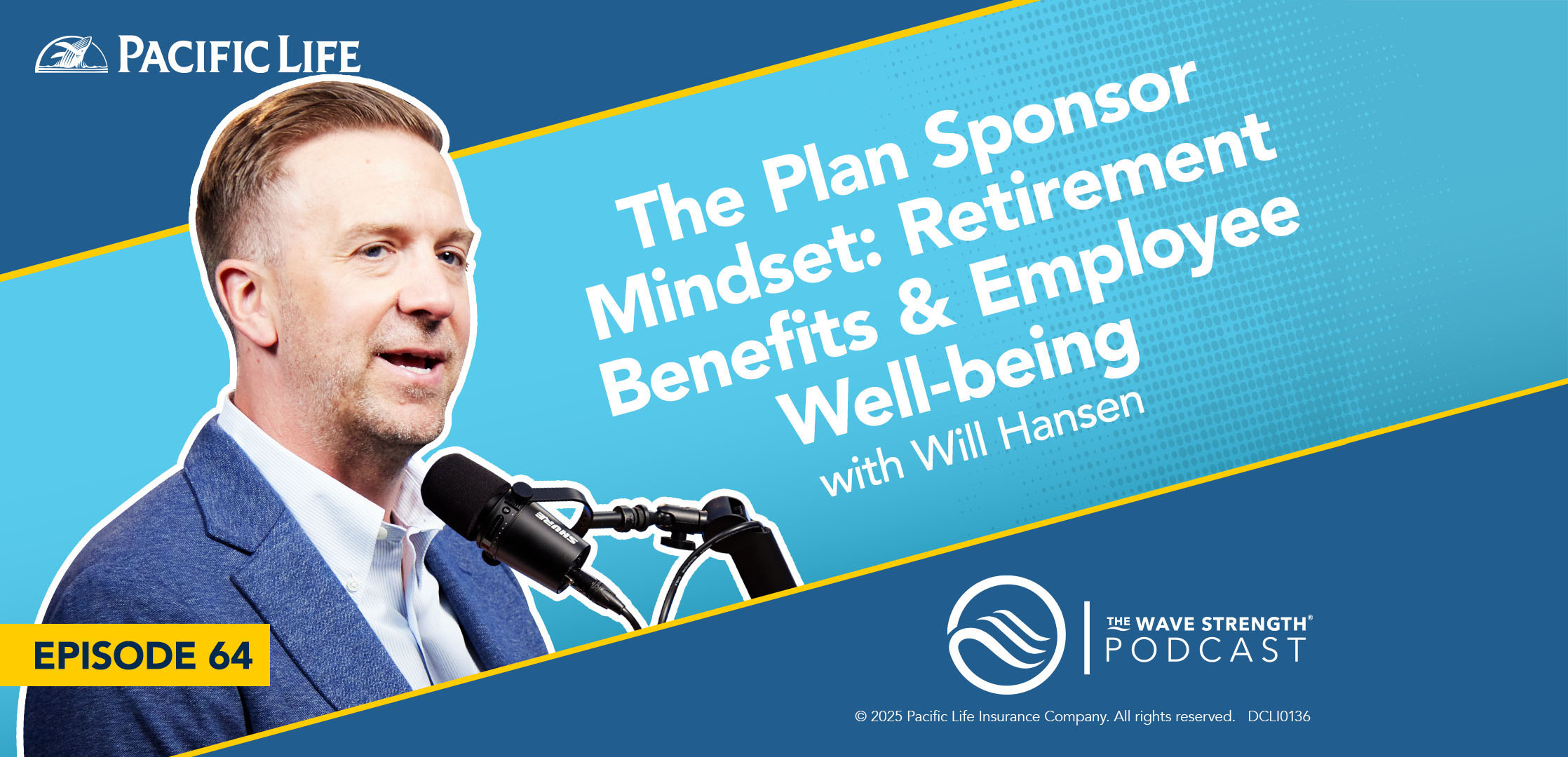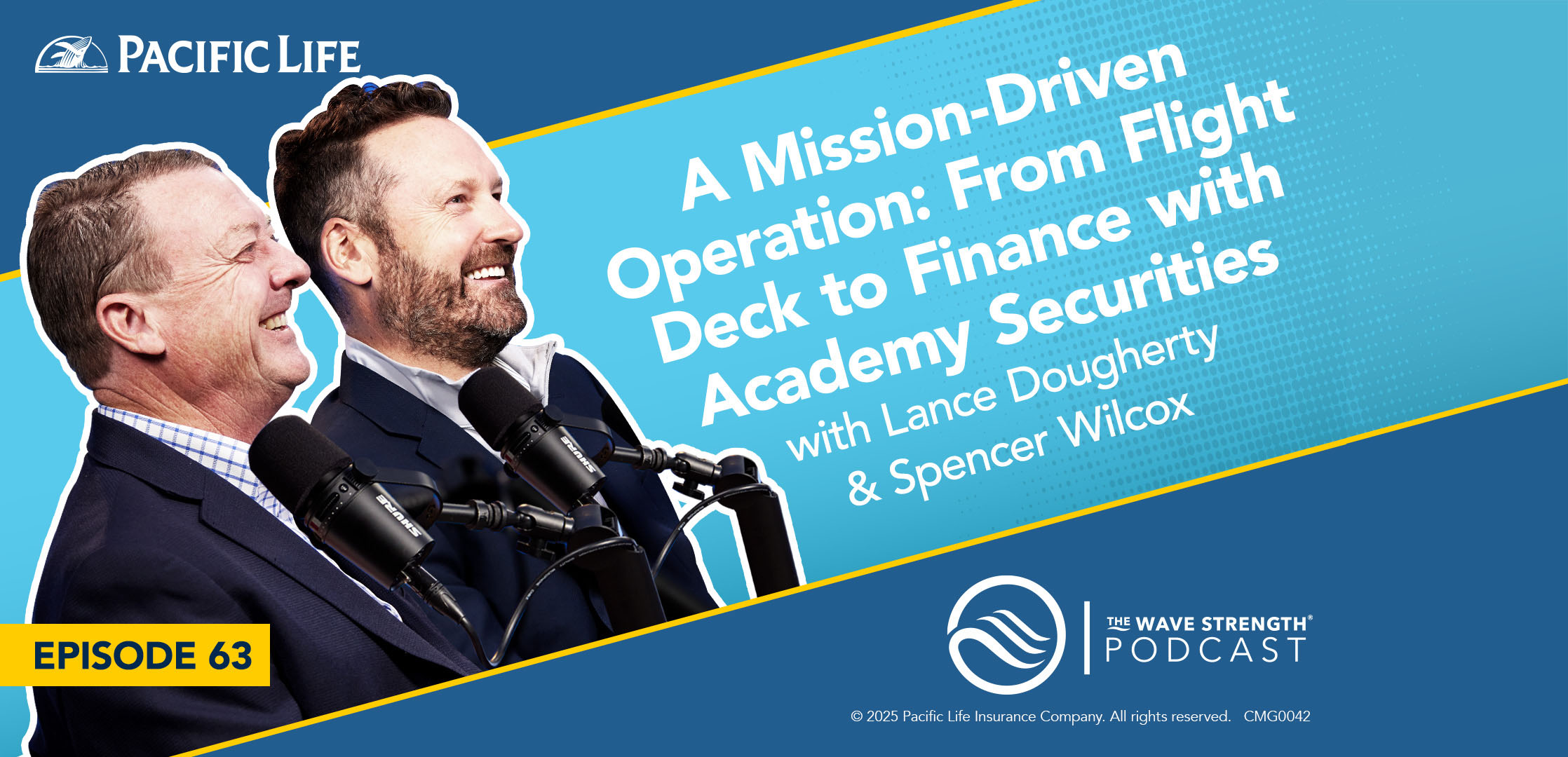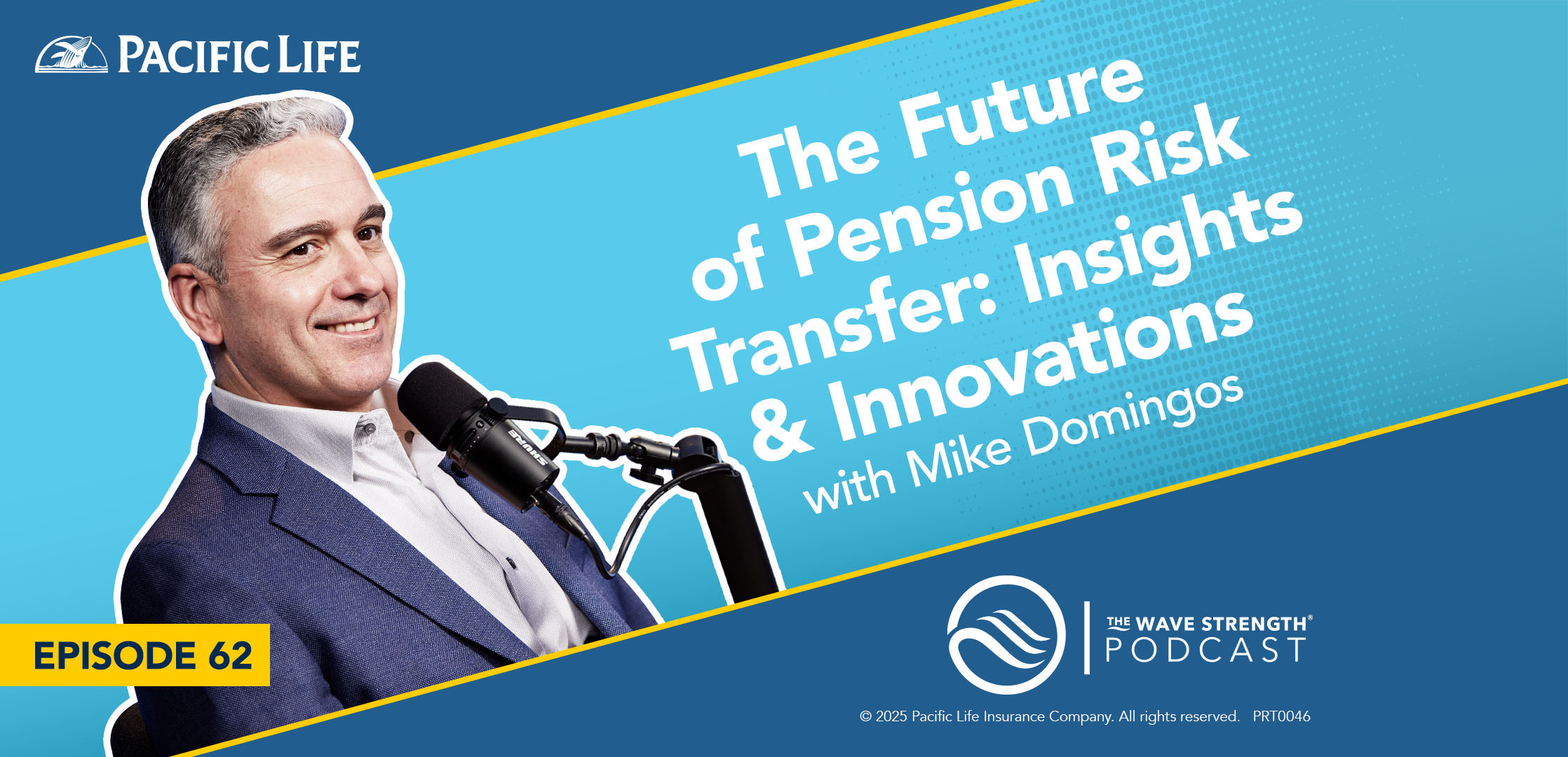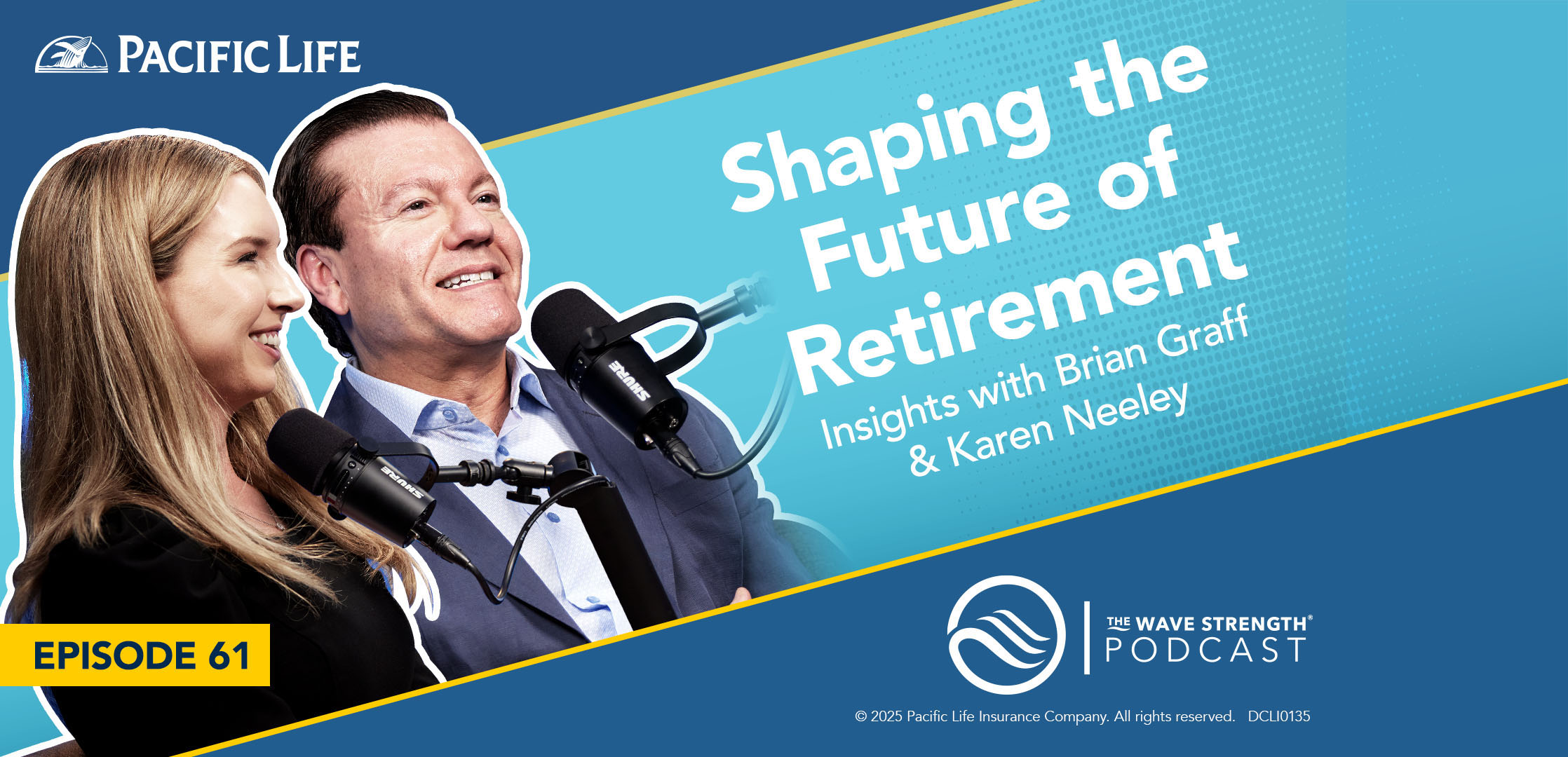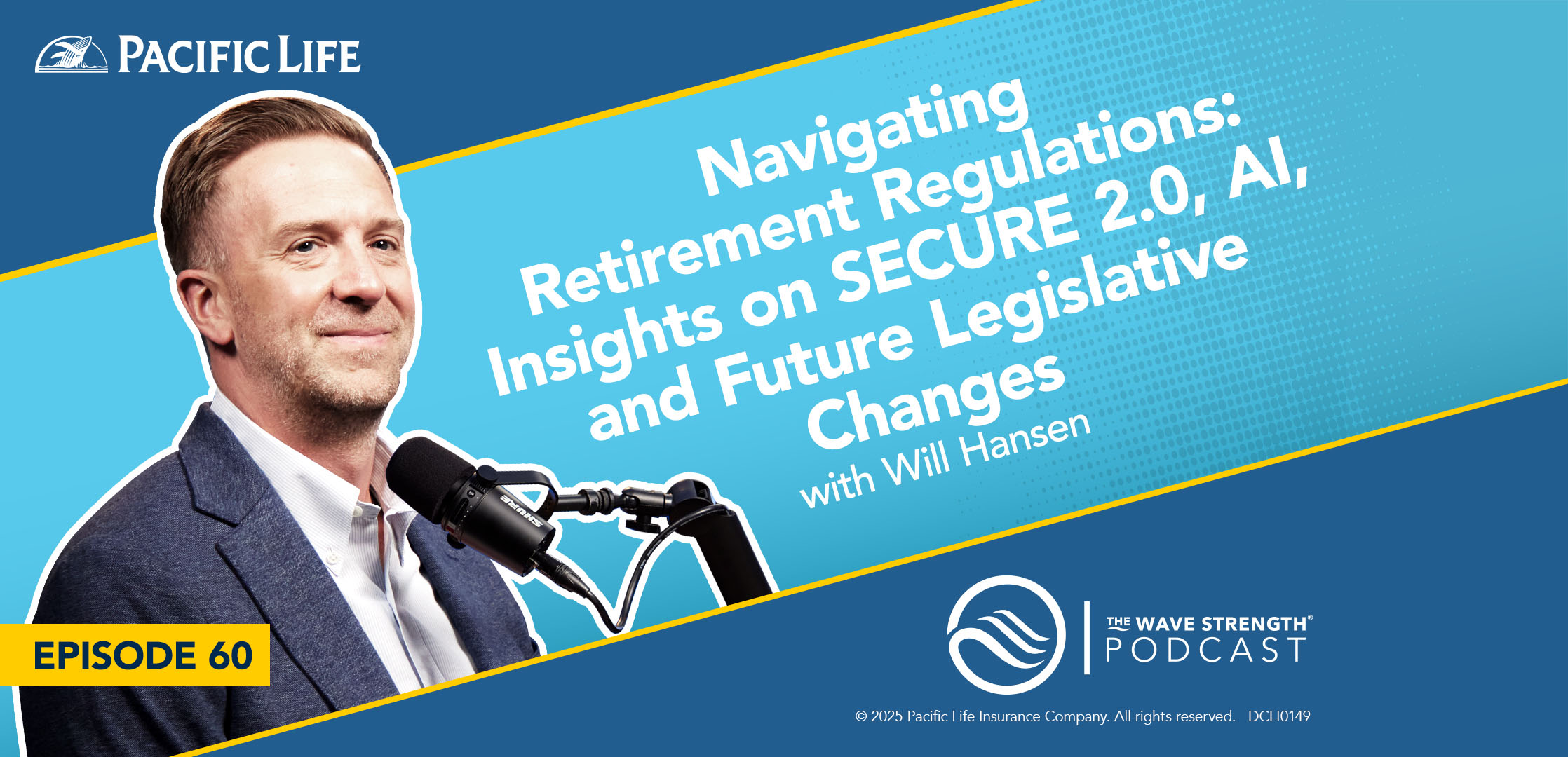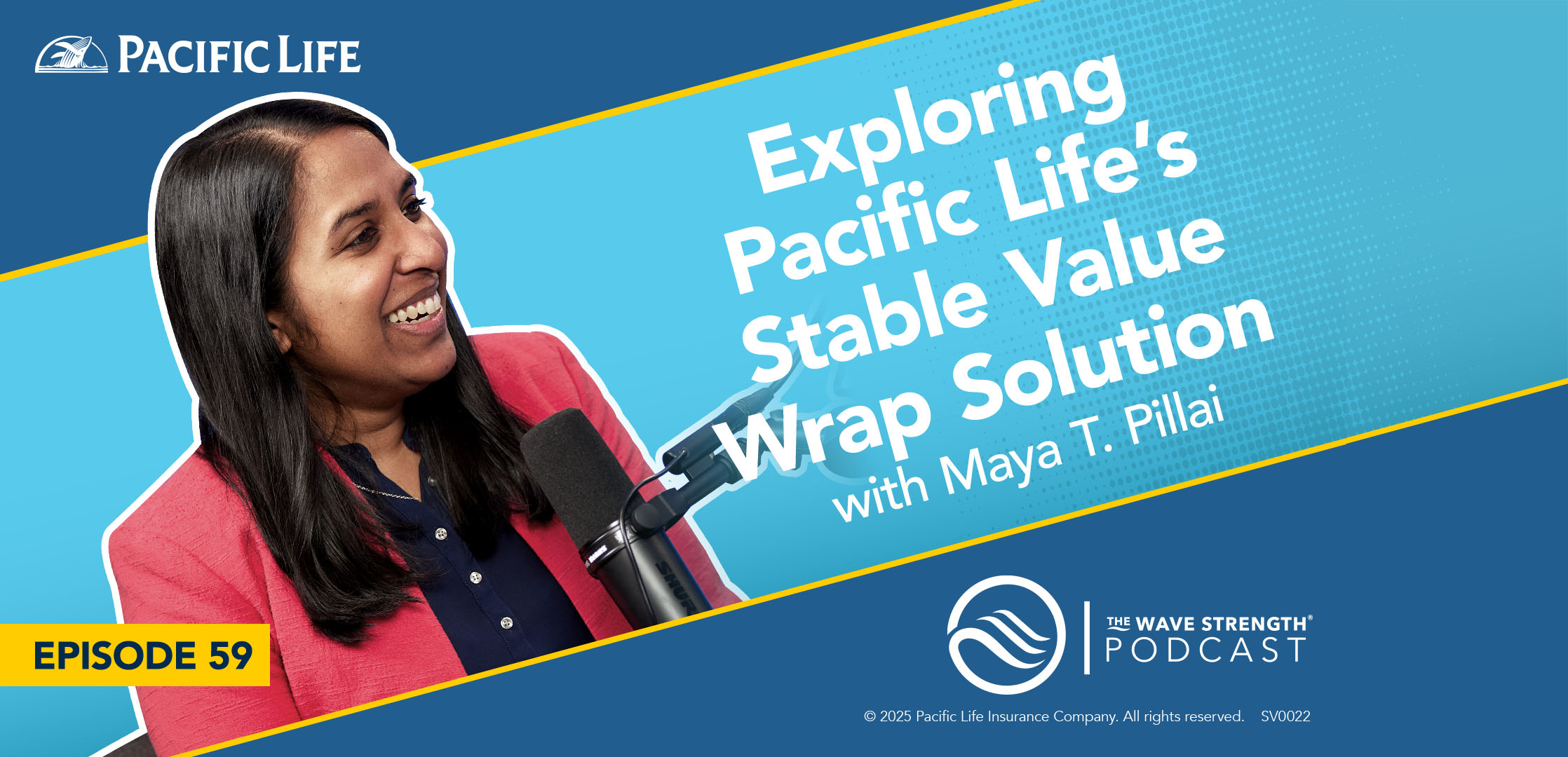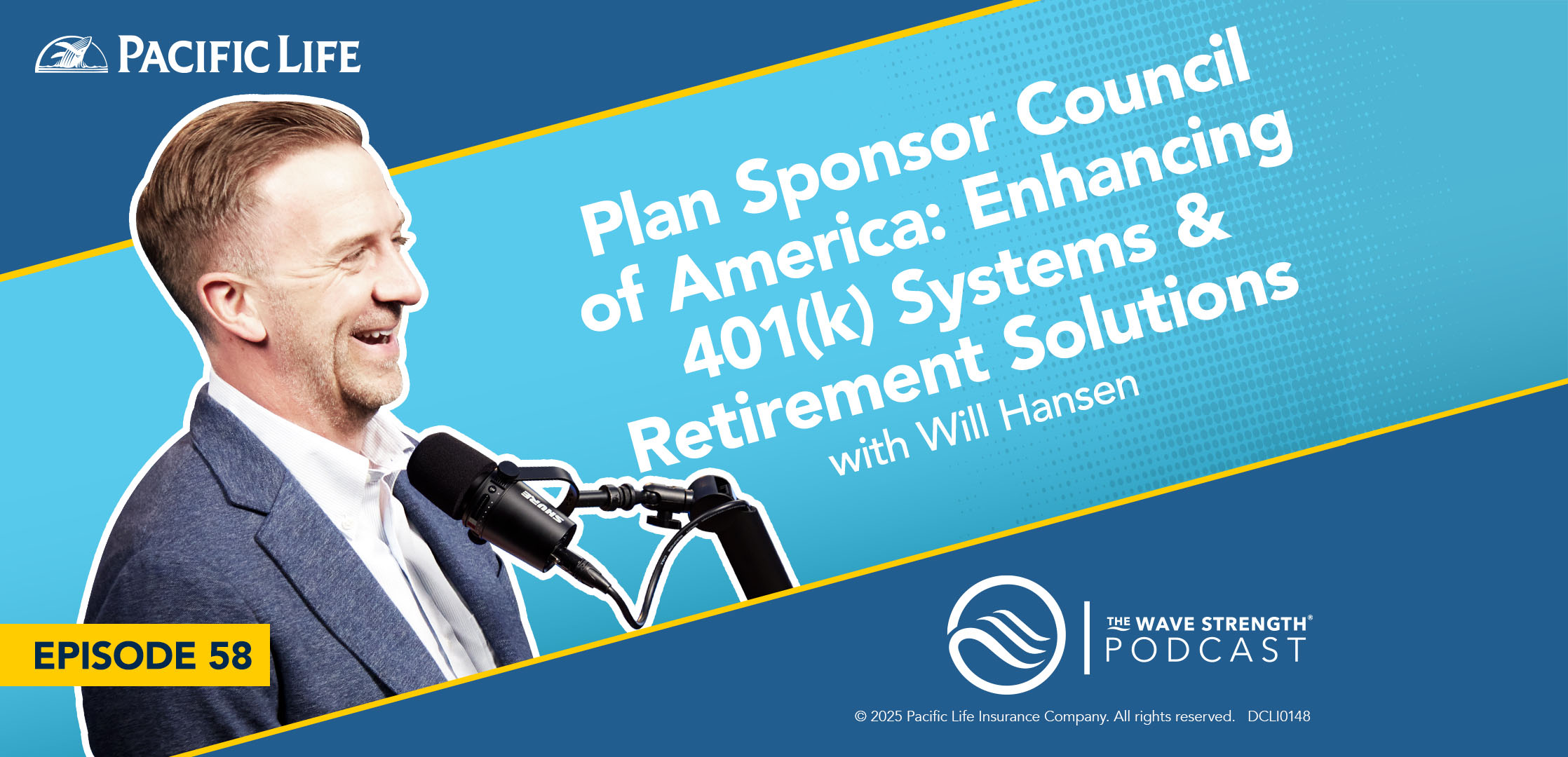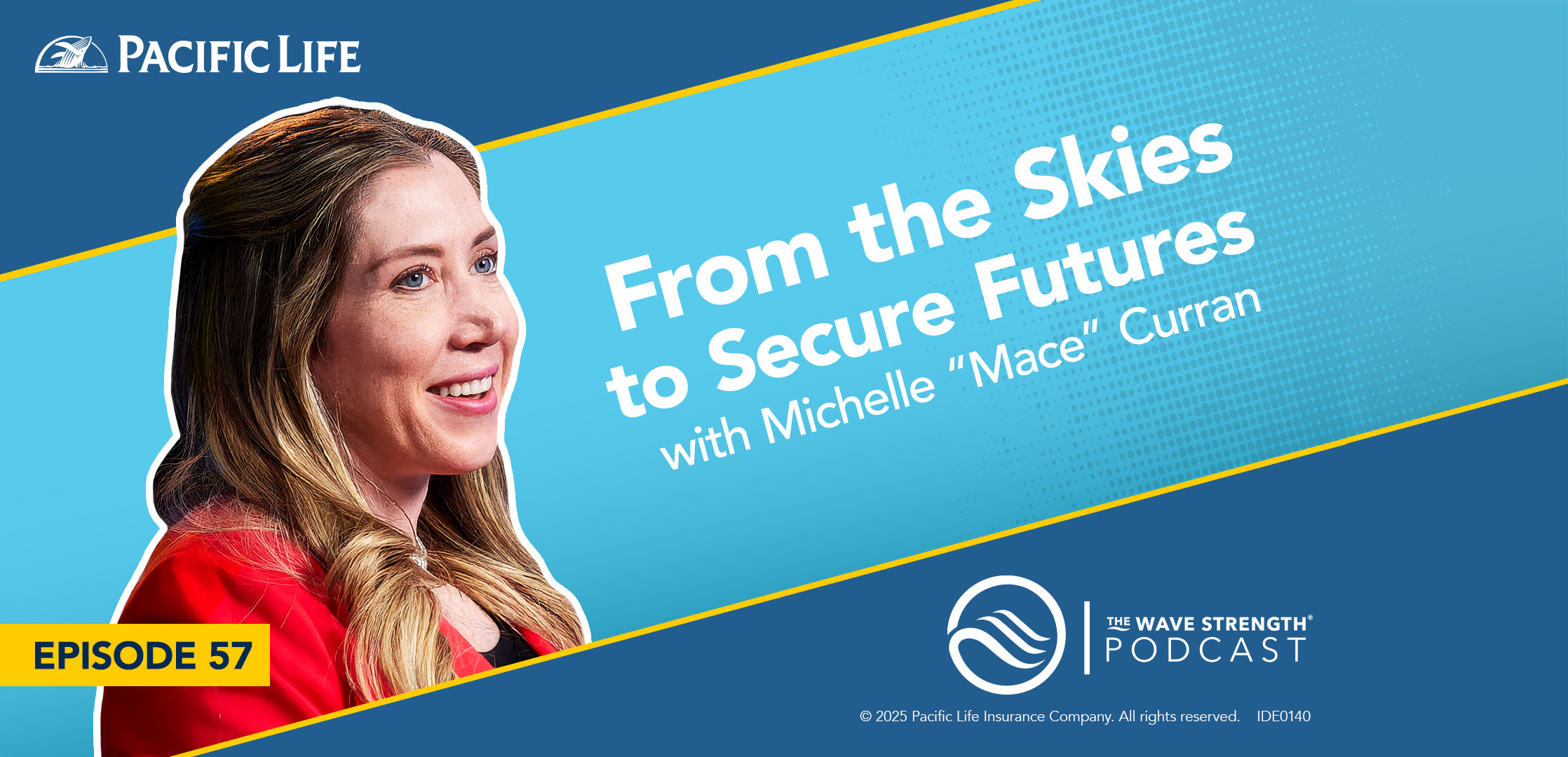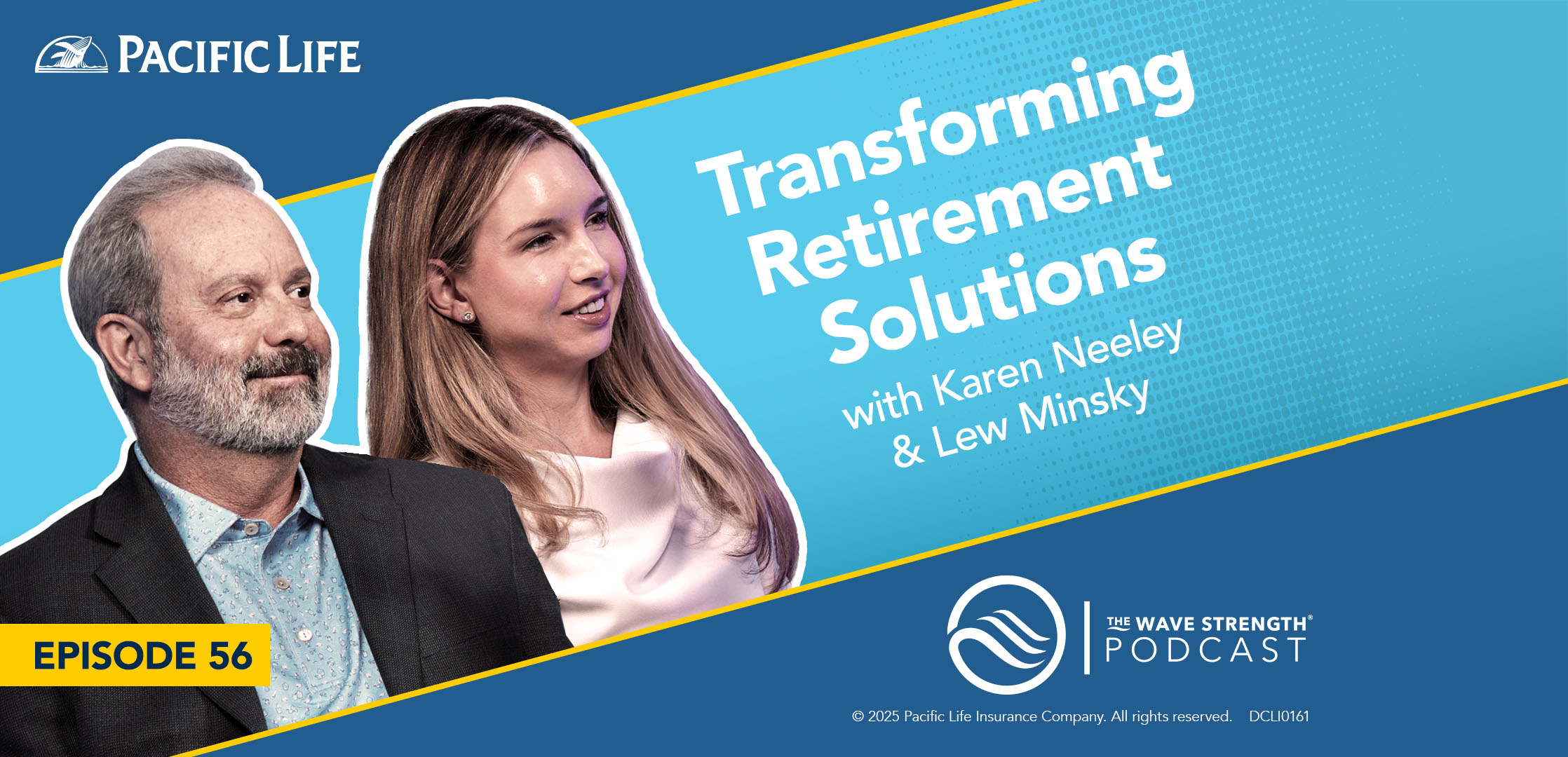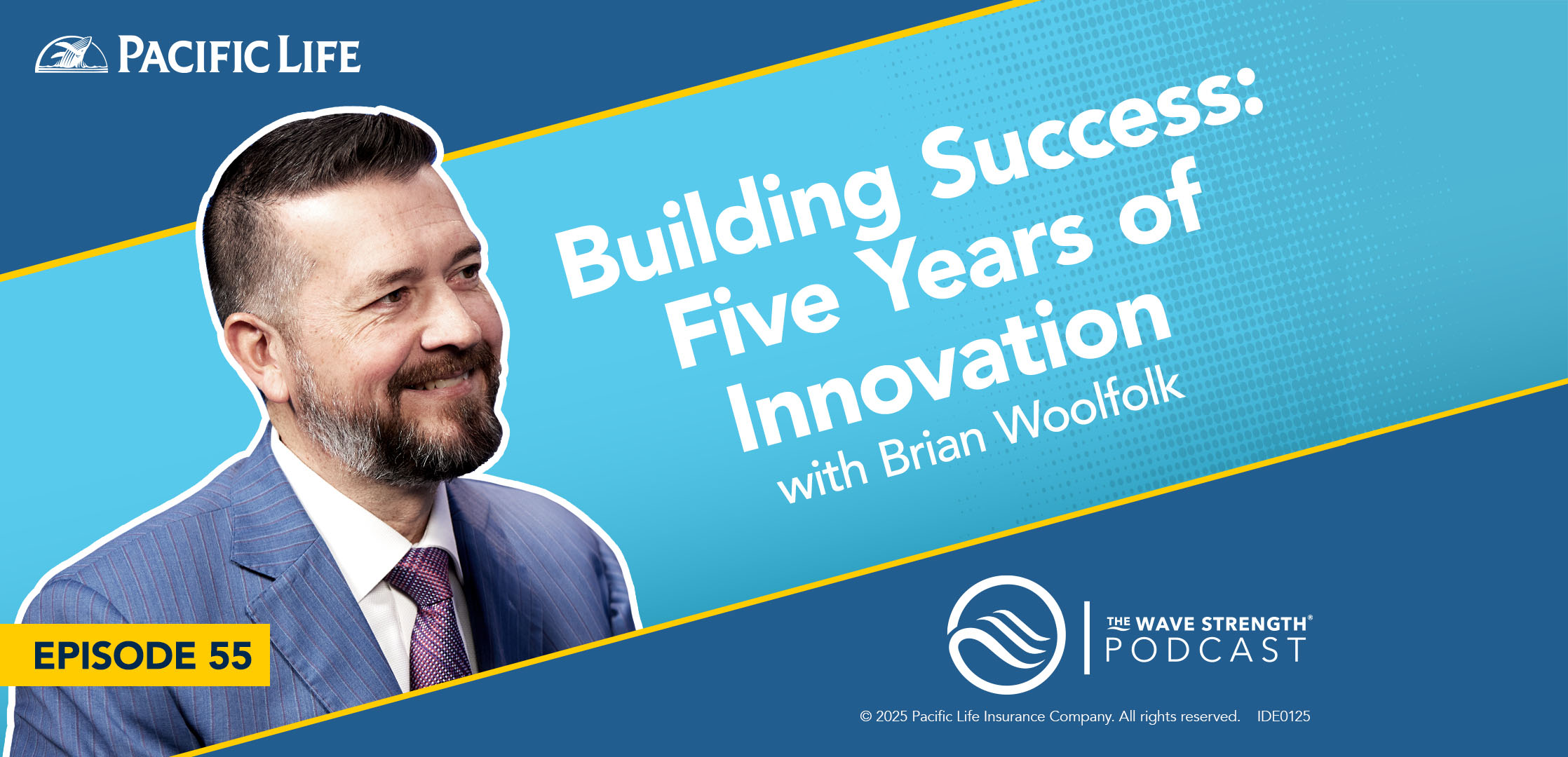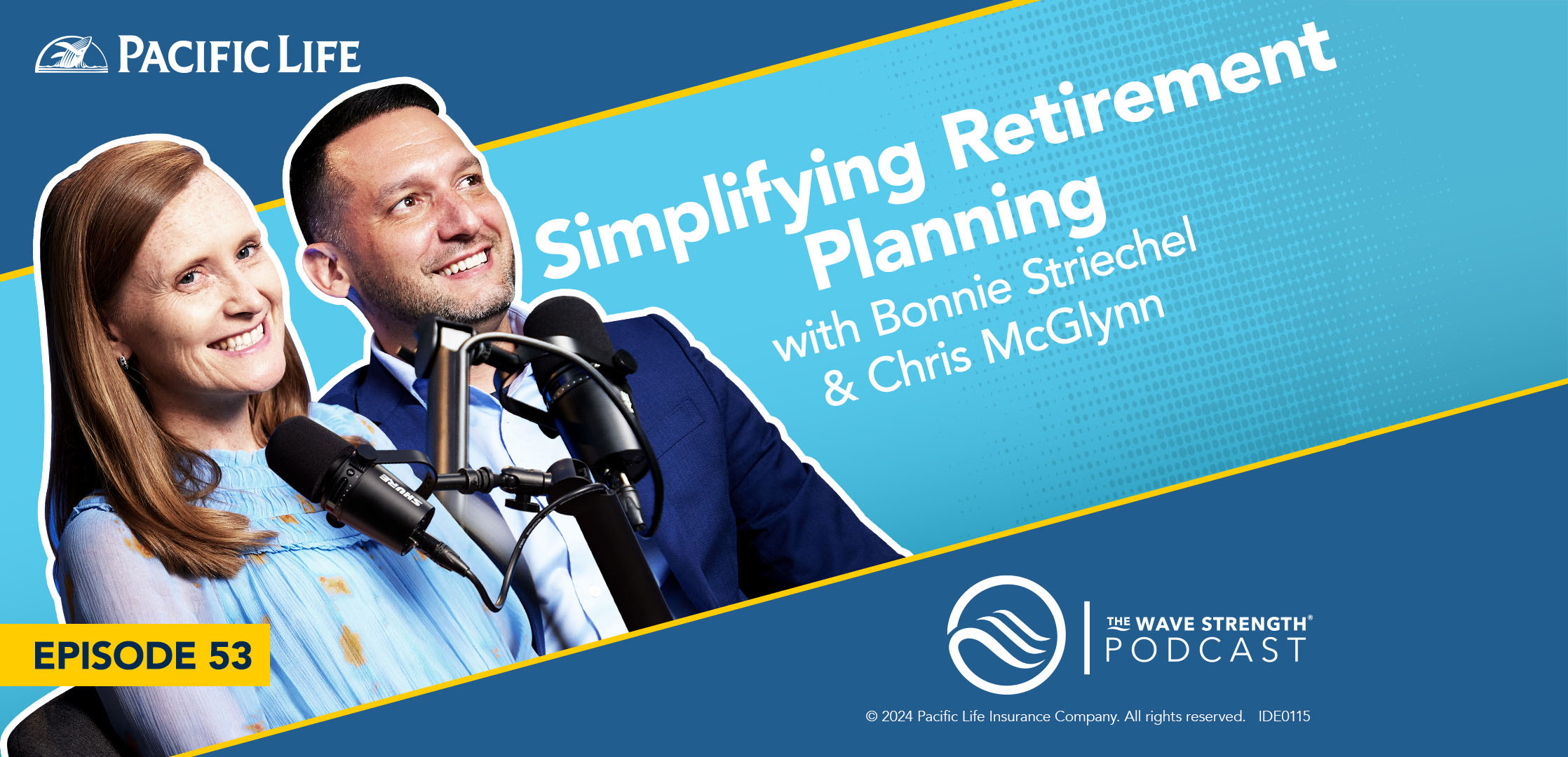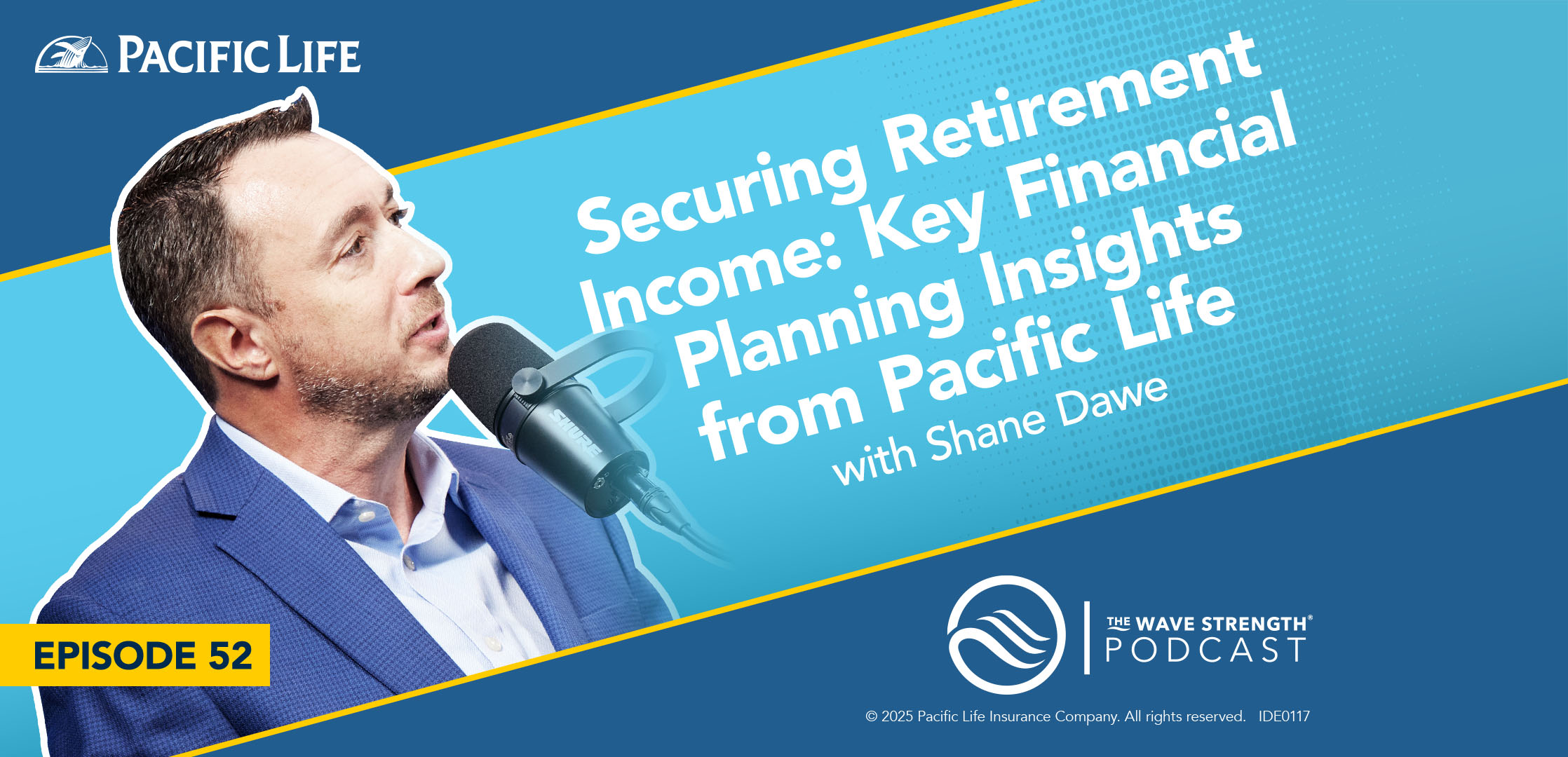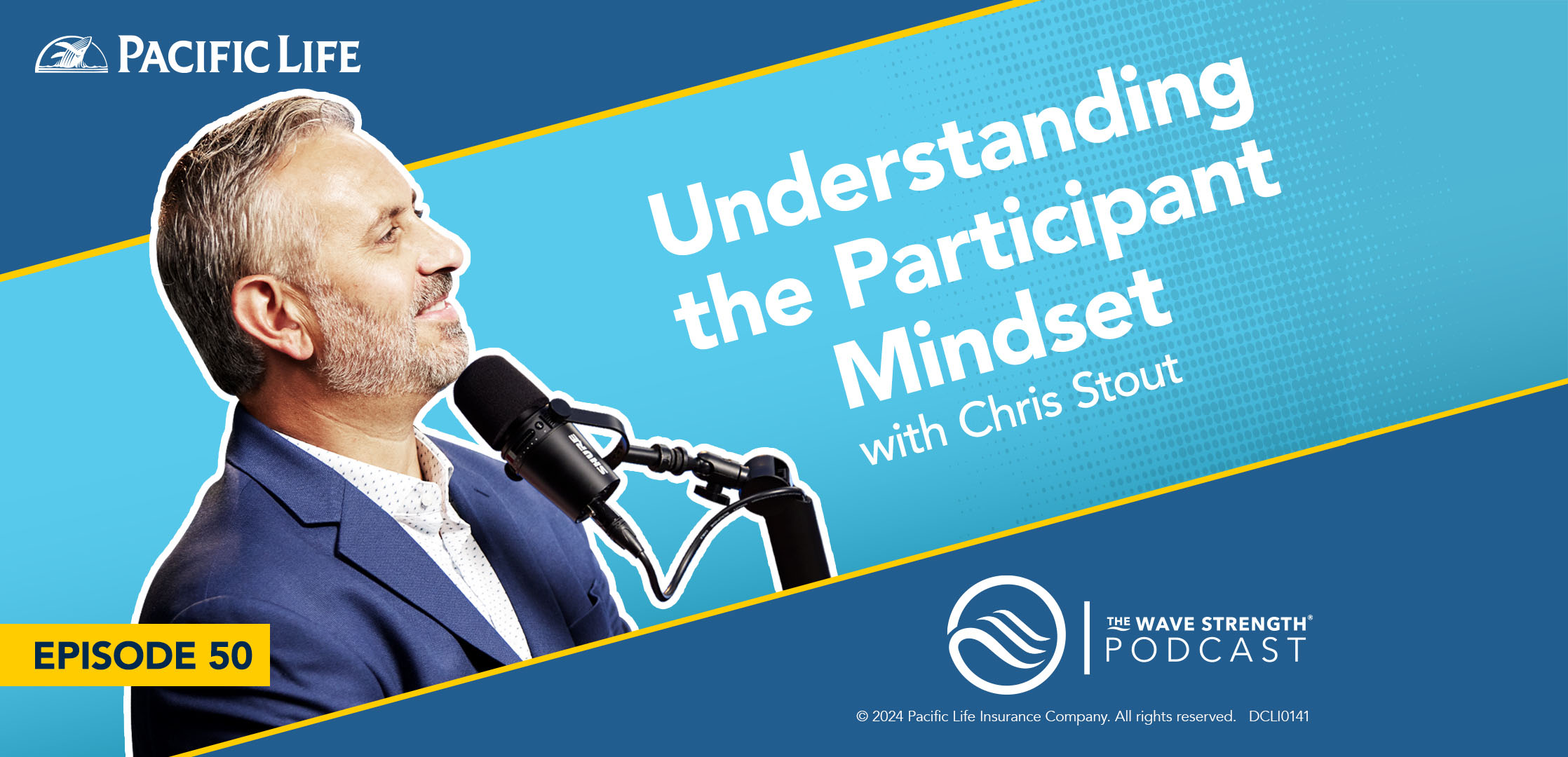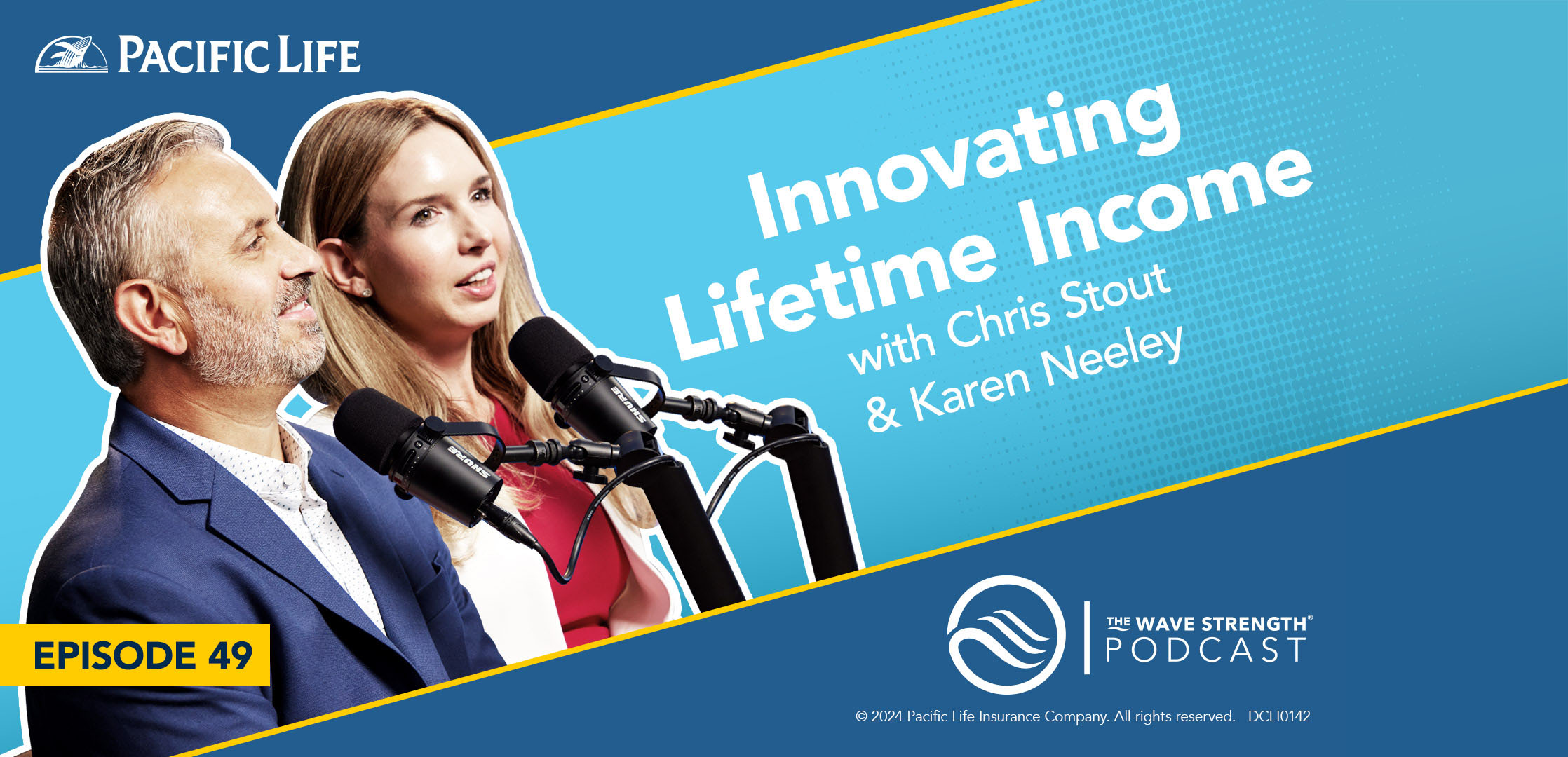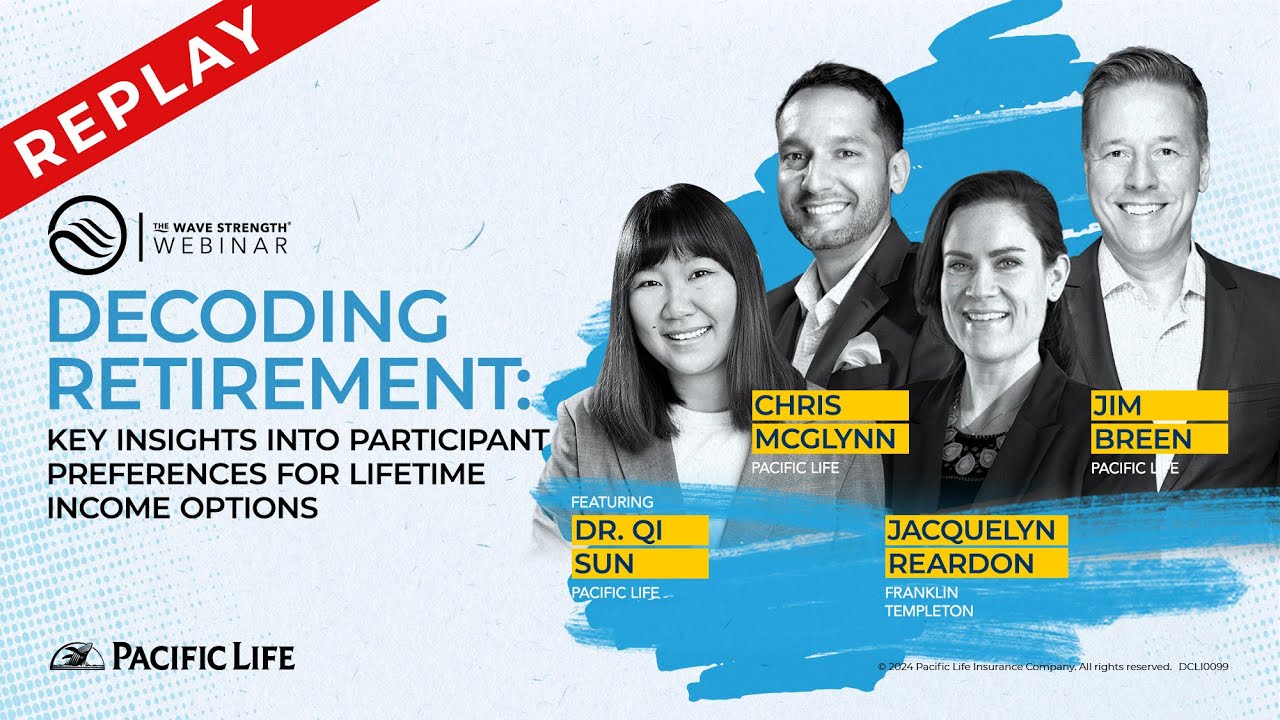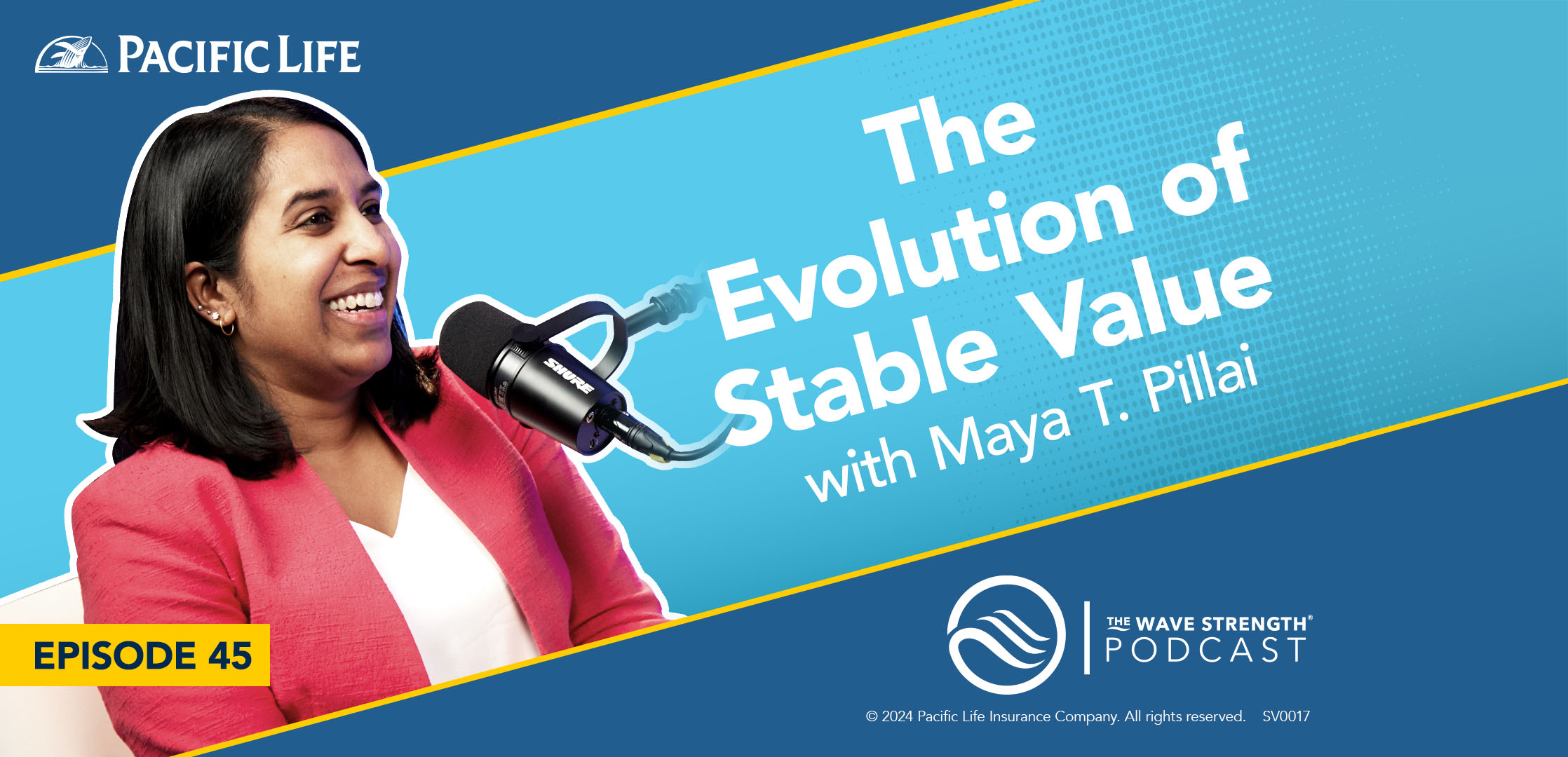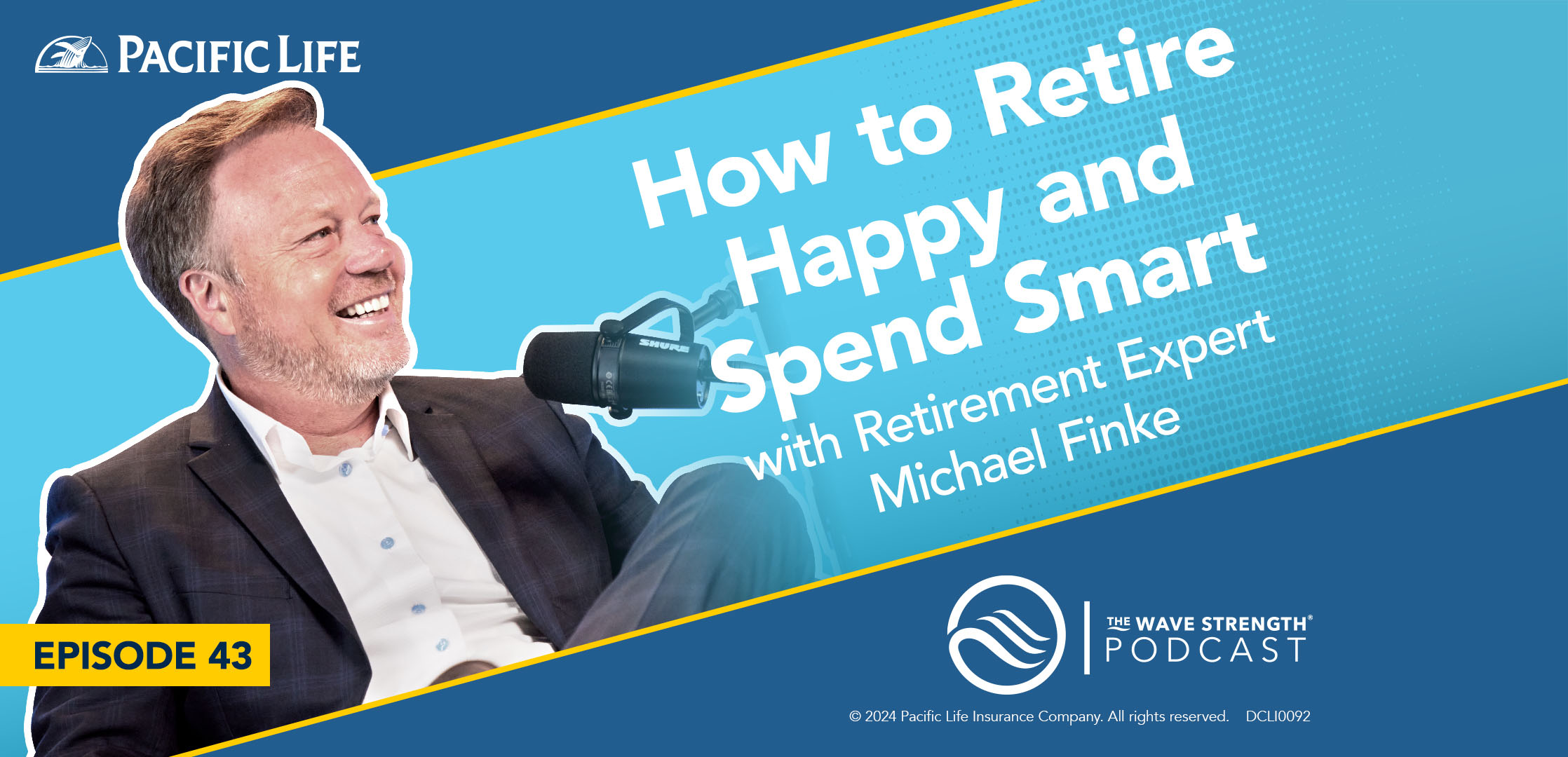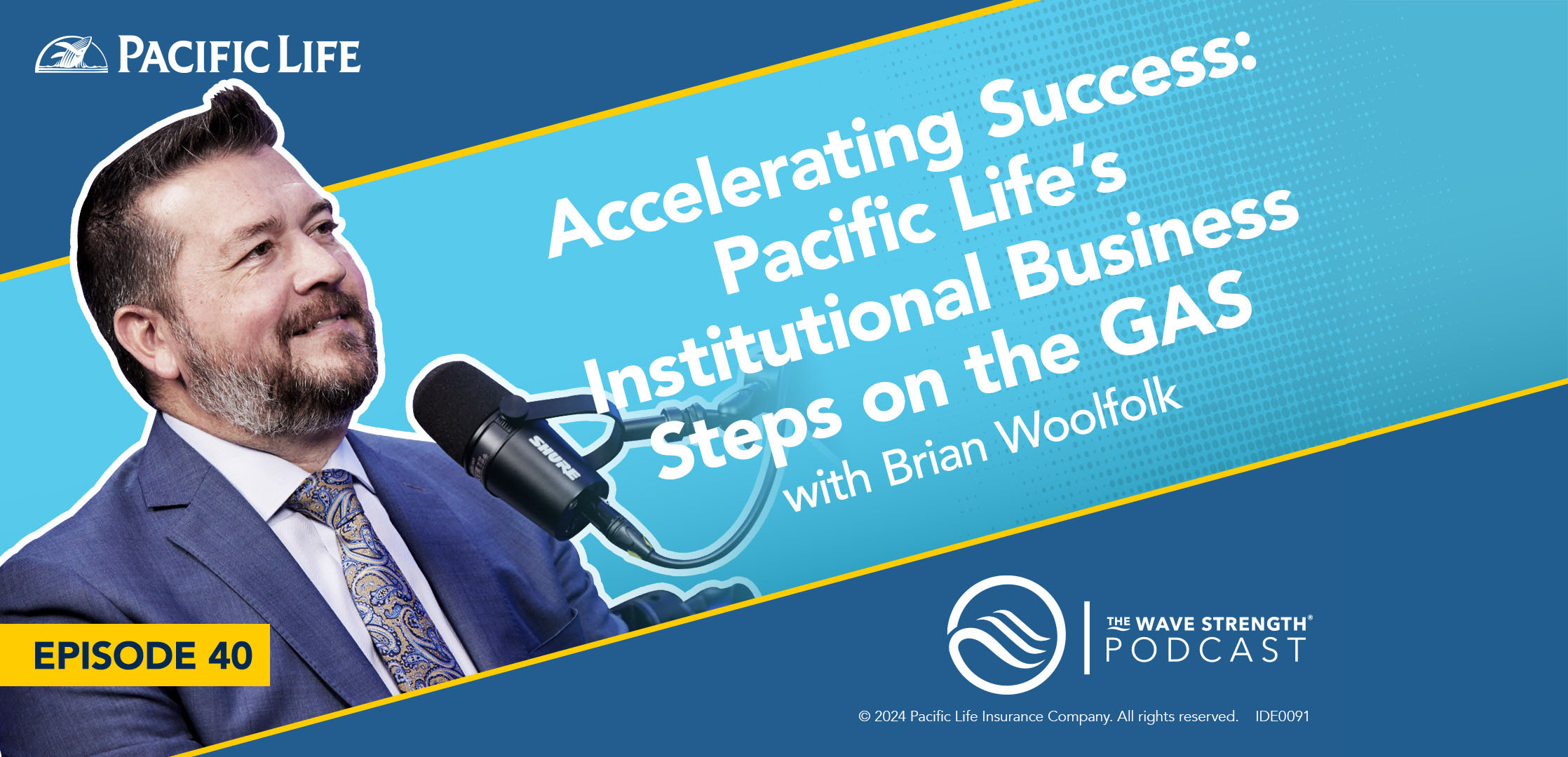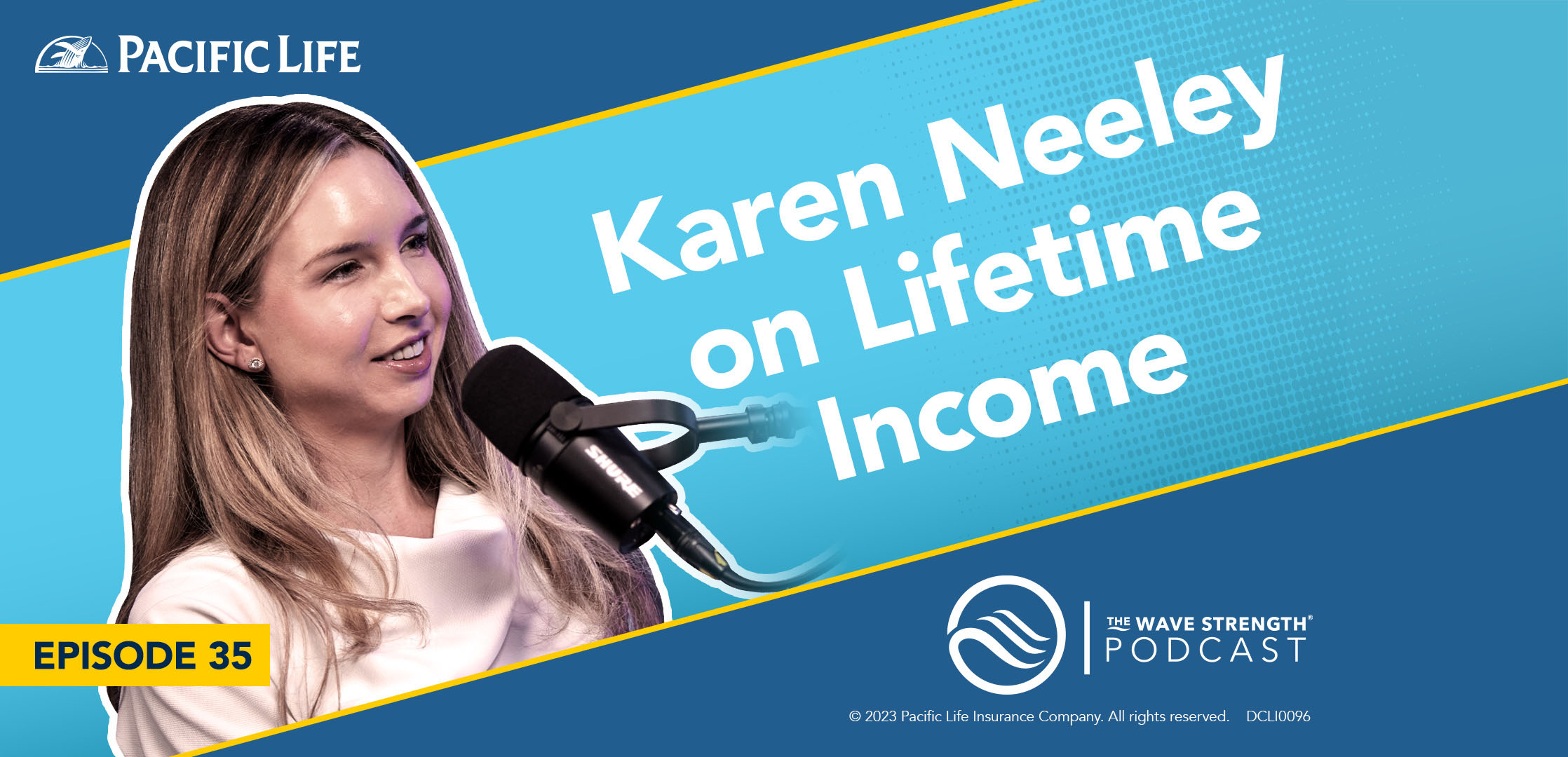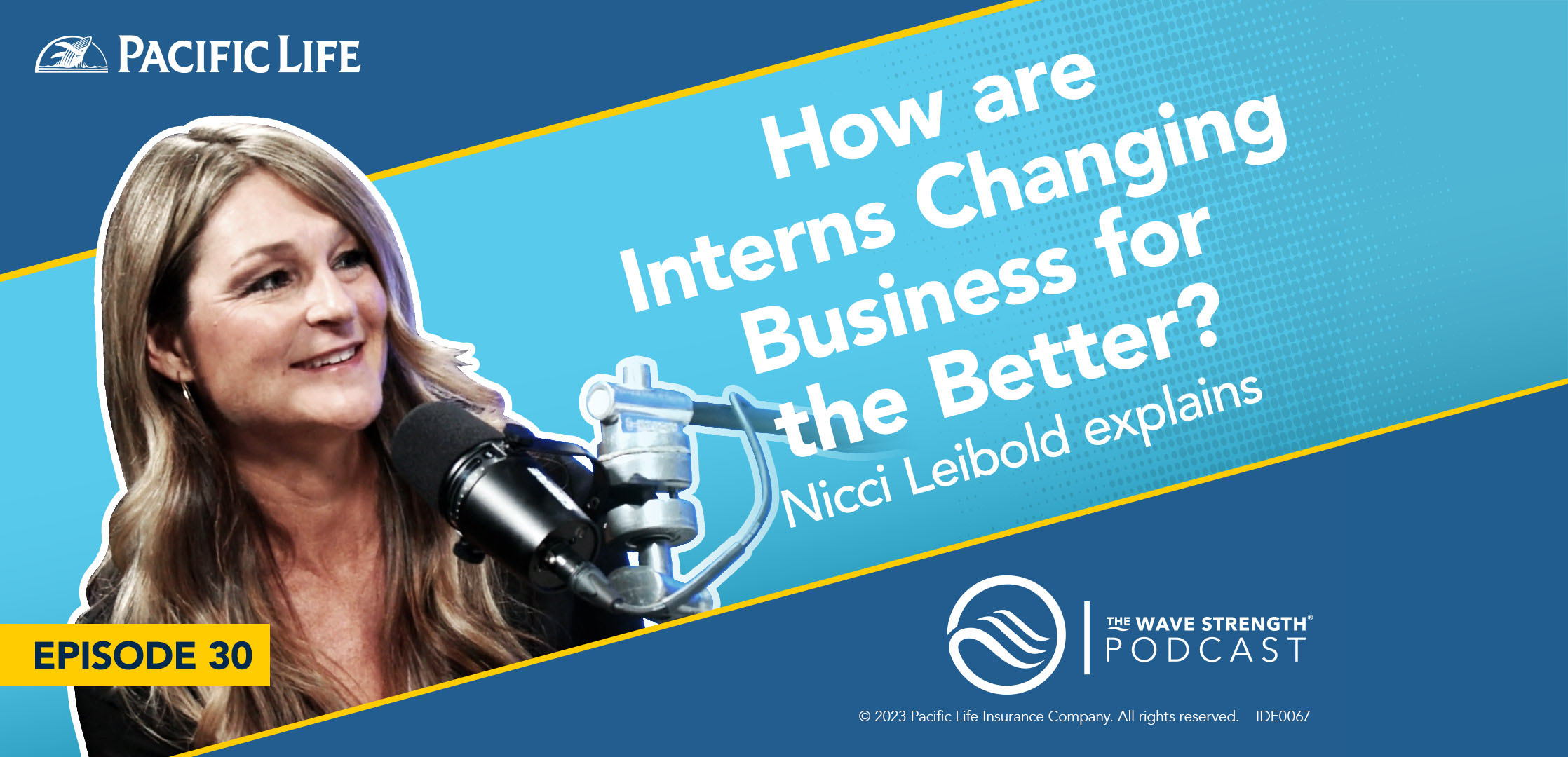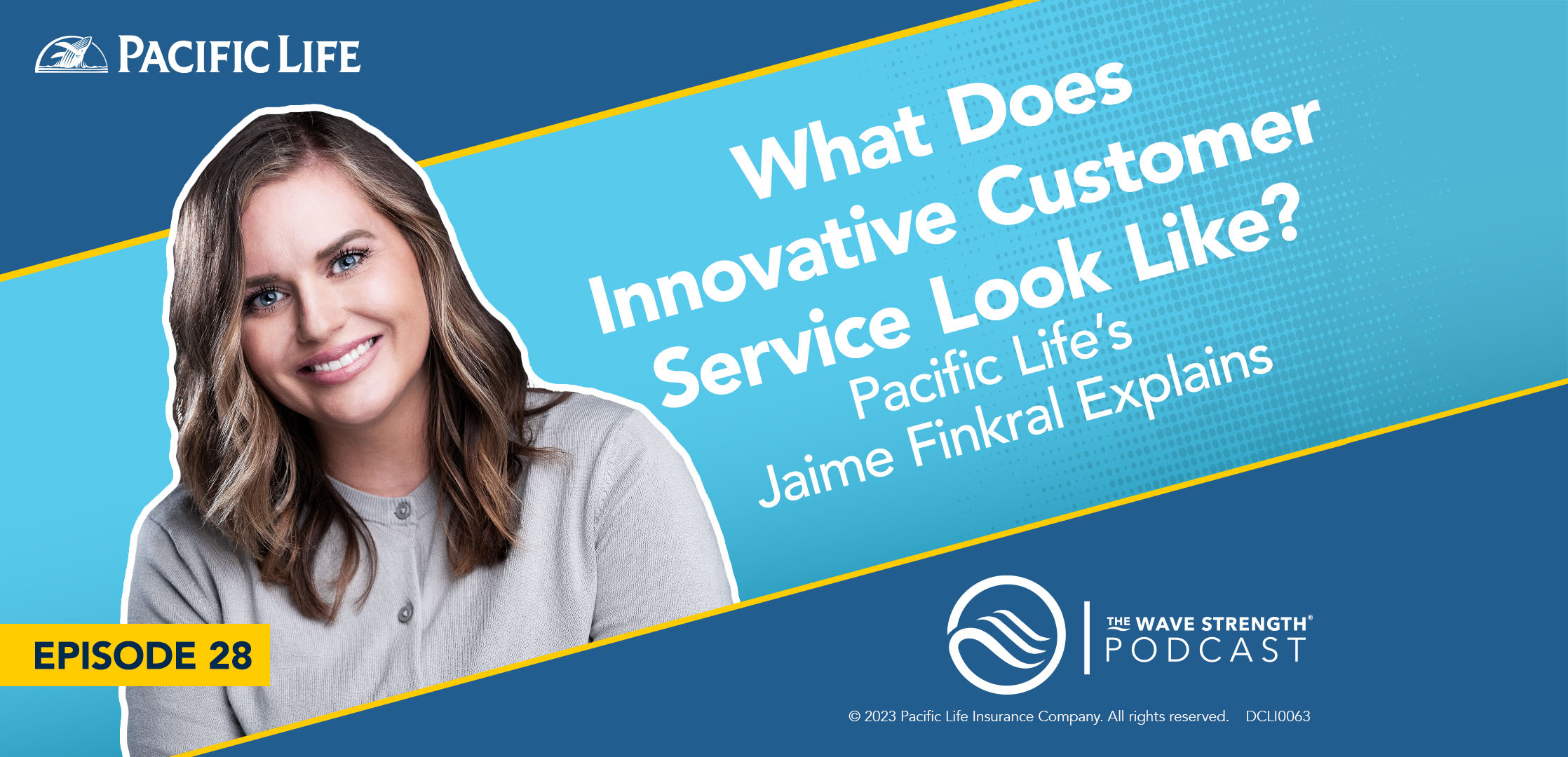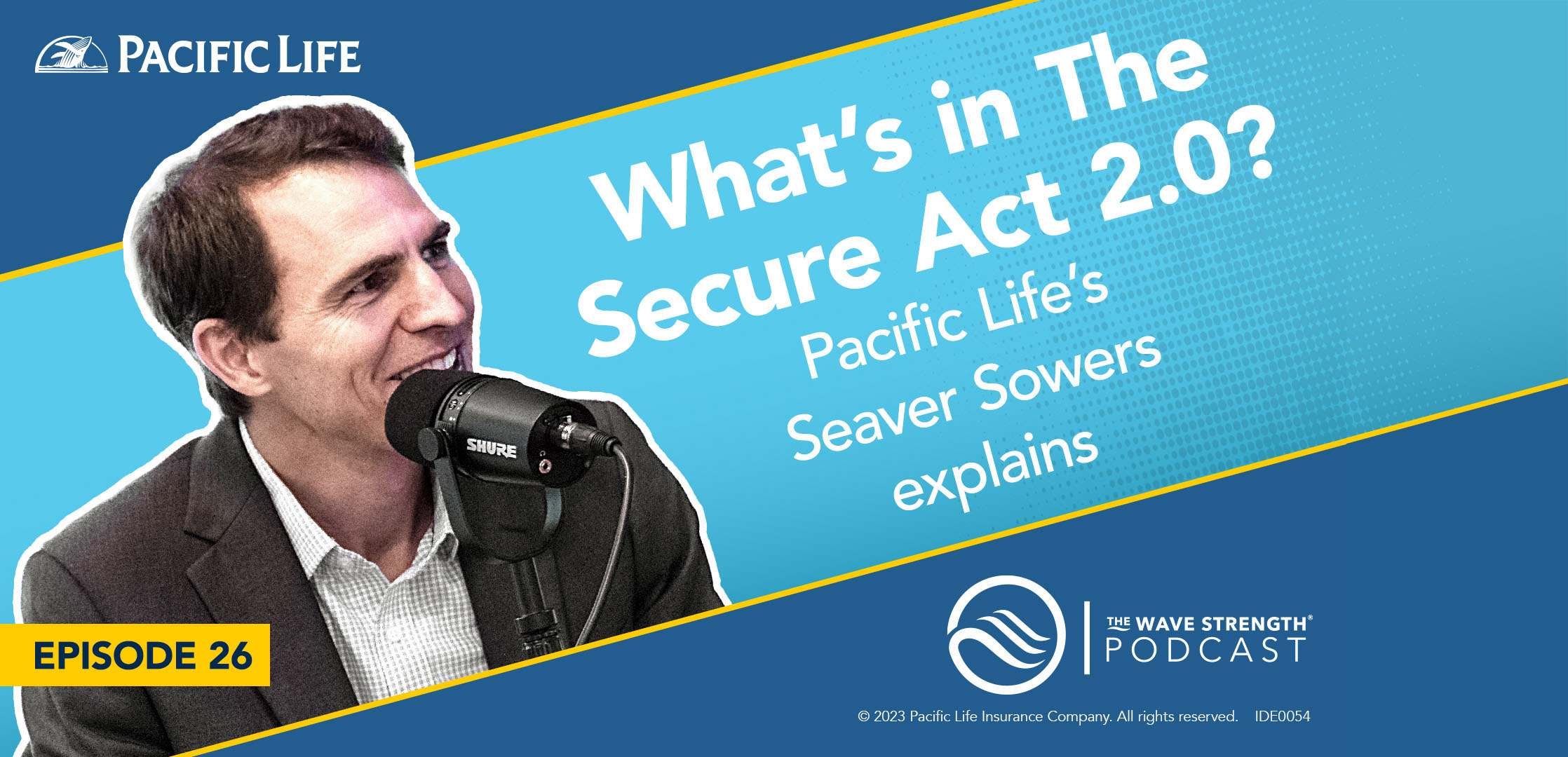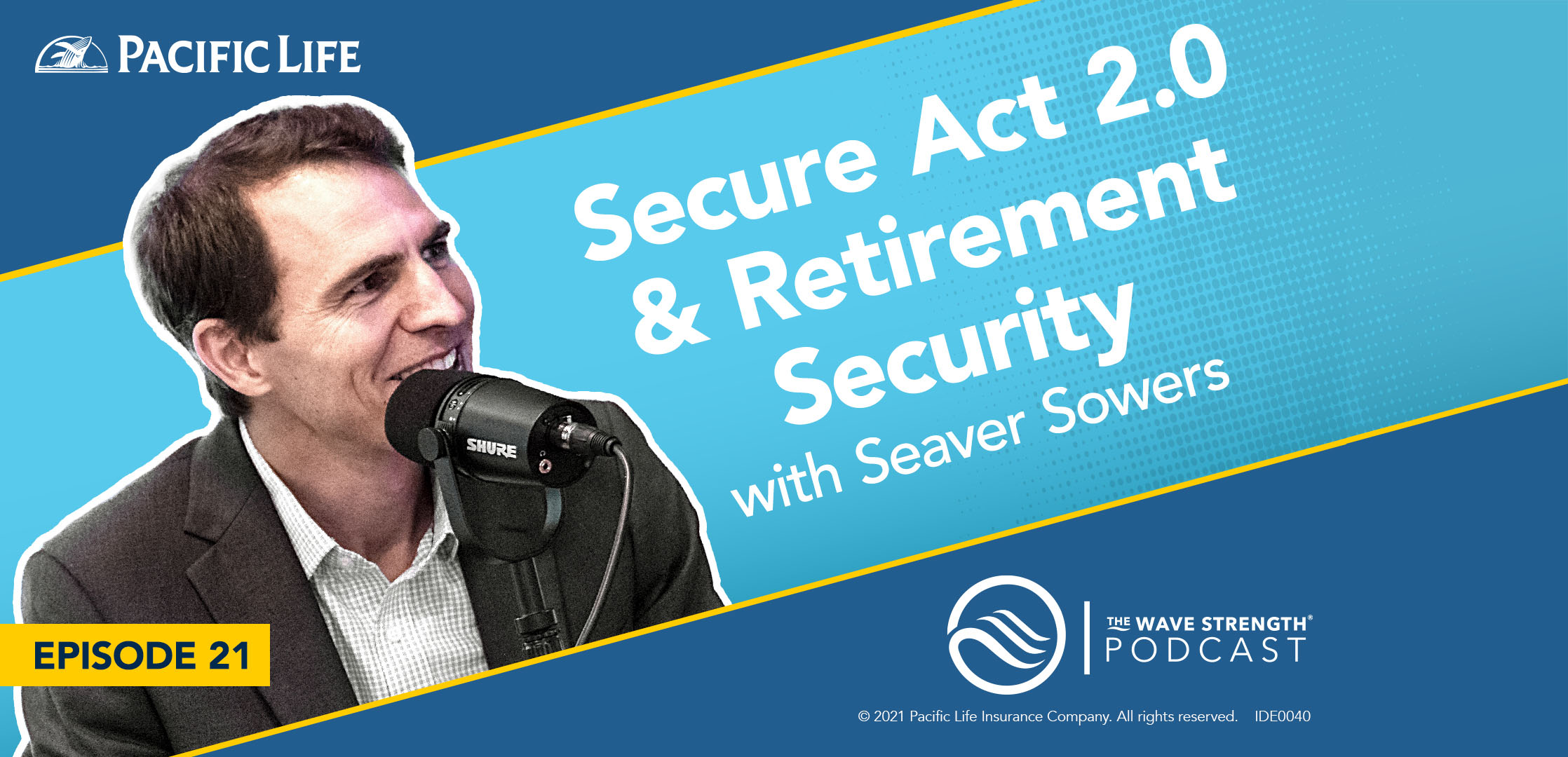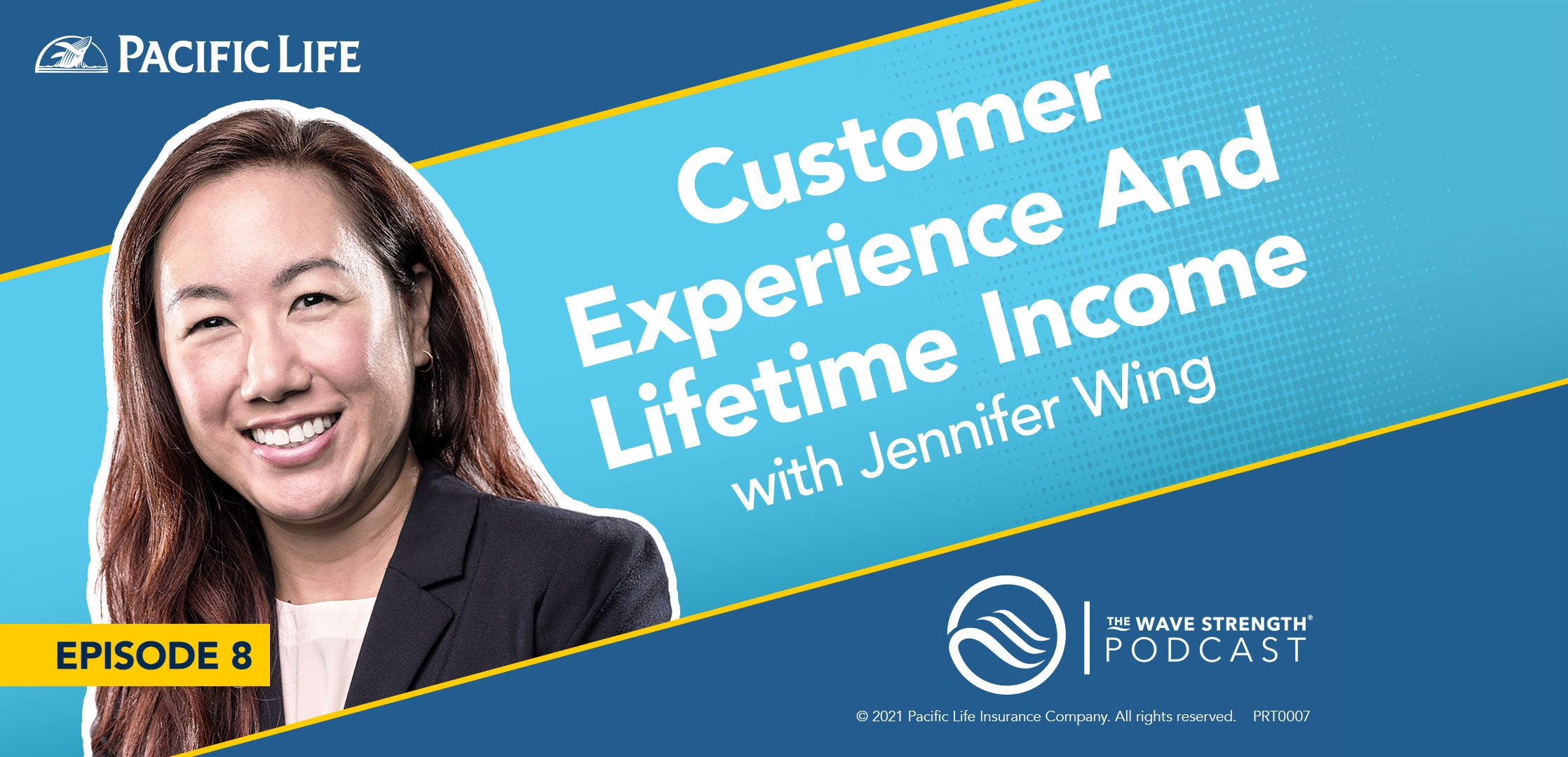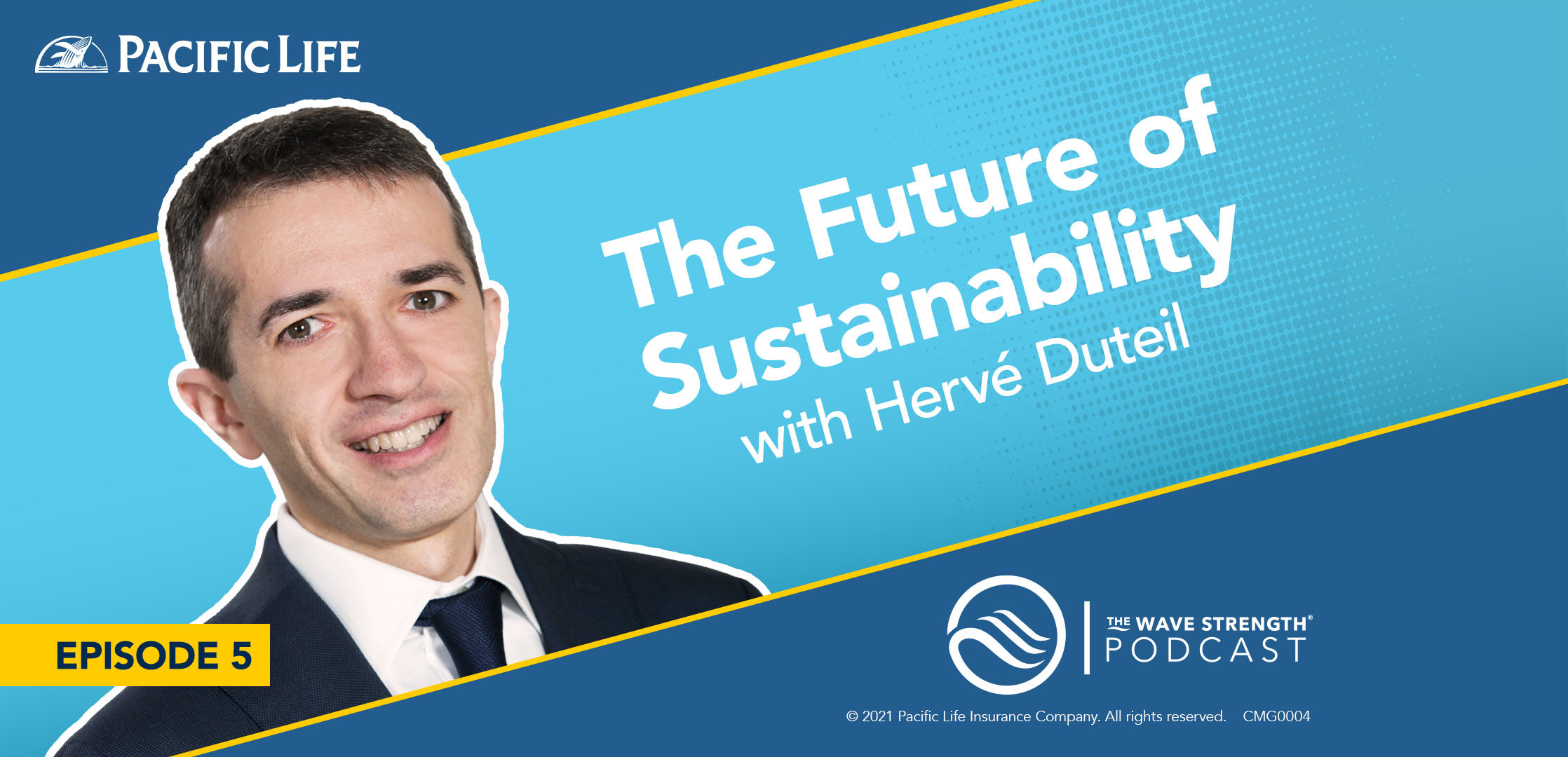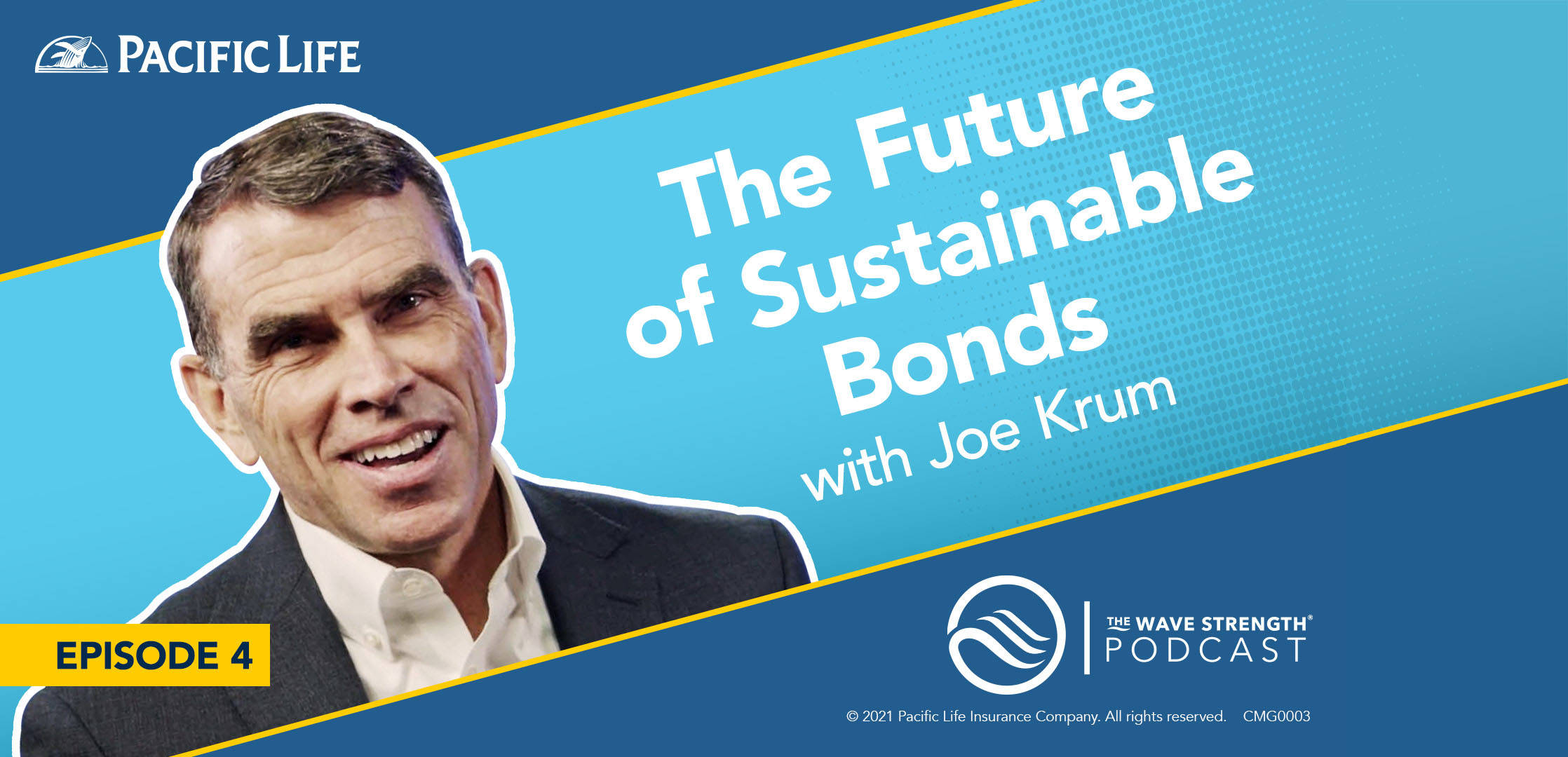[00:00:00] Jim Breen: Understanding the plan sponsor mindset.
[00:00:05] Will Hansen: Every single different employee has a different need, they're on a different financial journey.
[00:00:10] Jim Breen: Risk management.
[00:00:12] Will Hansen: I think they'd need to look at both costs as well as fiduciary, risk and liability.
[00:00:18] Jim Breen: And plan design and optimization.
[00:00:20] Will Hansen: We're good with set it, forget it, but now need next level engagement.
[00:00:24] Jim Breen: All this and more on today's episode of The Wave Strength.
[00:00:33] VO: Welcome to The Wave Strength innovative solutions for a secure retirement. Presented by Pacific Life.
[00:00:43] Jim Breen: Hello everyone, and welcome to another episode of The Wave Strength podcast series. I'm your host, Jim Breen, head of marketing with Pacific Life's Institutional team. Today, joining us in the studio is Will Hansen, the executive director for Plan Sponsor Council of America.
[00:01:01] Jim Breen: Will, thank you for coming on out and joining us for a series of talks today. I really appreciate it.
[00:01:07] Will Hansen: No, thank you for having me.
[00:01:08] Jim Breen: Absolutely, Will. We're going to talk about a lot of great things, the wonderful work that you're doing in the various areas as it pertains to bringing lifetime income solutions to retirees, taking care of folks at this important time of their life, making plans, helping them along these various journeys that they may be on. And I'm very excited to, jump into that conversation, and today specifically for this episode, we're going to talk about, the plan sponsor mindset, which is broad, but, as our audience will see very quickly, we're going to have a very deep conversation about that. Before we begin, I want to encourage you to head over to YouTube, to Audible, and to Spotify. Hit like and subscribe once you search The Wave Strength so that you can stay current with new episodes as it becomes available. So Will, thanks for, joining us and, maybe you can start by sharing with our audience a little bit about your background, which I know is extensive.
[00:02:09] Jim Breen: You've had a lot of experience in the industry, but maybe you can help our audience, understand a little more about you.
[00:02:14] Will Hansen: Yeah. Hopefully, not too much experience. I'm not too old, but, it is a little bit unique, so I did start off my career as a benefits attorney, so just working at a large law firm, but quickly realized that the billable hour, wasn't for me, but it was my first taste of working on retirement plans on healthcare plans, working directly with HR professionals and plan sponsors. I then quickly transitioned to Capitol Hill, working, for a U. S. Senator, handling just broad economic policy, did that for about four years, decided I needed a break from Washington DC, who doesn't when you go and visit there, it's a lot to handle, and, moved to the West coast, actually, and, started my career in HR.
[00:02:58] Will Hansen: It was a very short career, but it was a great way to learn firsthand how an HR professional goes about, their day, implementing retirement plans, working on their retirement plans and their, healthcare plans as well. So I did that for a few years, and then transitioned back to DC, capitalizing on my now background in HR, my prior experience working for a U. S. Senator and started to become a lobbyist, lobbying on behalf of, plan sponsors and other folks in the retirement industry on improving, retirement plans across America. So I like to say I'm a recovering lawyer, recovering, Capitol Hill staffer and recovering, HR professional, and now I'm just a lobbyist, as well as working directly with plan sponsors as the head of Plan Sponsor Council of America.
[00:03:49] Jim Breen: Yeah. What, an interesting resume to say the least, and, I want to call out to something unique, which I appreciate about your background. Here you are in a position where you are working with these plan sponsors. You're helping to bring awareness, education, et cetera, to the forefront for these folks, these HR administrators, et cetera, that may not be thinking about a retirement plan may not be the first thing on their mind, right? But here you have that experience in your role when you were an HR professional, you are able to see how they think you're able to be there in the trenches because you were in those trenches, right? So that's a really interesting perspective.
[00:04:26] Will Hansen: Yeah, no, it's great. I think, as executive director of PSCA, and for background, for the audience purposes, PSCA, we're a non profit education association, working with plan sponsors to help them do their job, to administer a retirement plan. Running the organization, the fact that I used to be a plan sponsor and now I understand, the legal legislative regulatory implications of being a plan sponsor, really, hopefully, further betters, the organization's mission.
[00:04:55] Jim Breen: And you talked a little bit about PSCA and the great work that they're doing. Maybe you can talk a little bit more for our audience members that this is, might be the first time they're hearing about PSCA. Walk us through the mission, walk us through some of the great work that they have underway and some of the great future plans that are upcoming.
[00:05:14] Will Hansen: Yeah, sure. in three words, I can say that PSCA is advocacy, education, and insights, so we advocate on behalf of plan sponsors on Capitol Hill, state and local level as well. We provide education materials, credentials, in order for plan sponsors, HR professionals to just understand, how to operate, administer a retirement plan for their employees, and then insights.
[00:05:41] Will Hansen: We have a lot of, materials, daily newsletters, magazines and whatnot, constantly pushing those out there, so that plan sponsors can, really stay. on top of their game. So we have a few thousand members spread across the country, small plans, midsize plans, large plans, you name it, the organization really is for everyone and it's been around since 1947.
[00:06:04] Will Hansen: So it is a very long standing organization. that we've had, for a number of years.
[00:06:10] Jim Breen: Wow, 1947, that's pretty amazing. PSCA has been around a lot of great work has, come from this organization and so much more, good work to come, which I'd like to talk to you about in this episode here, Will.
[00:06:25] Jim Breen: So let's begin, I'd love to, again, in this episode, unpack that the plan sponsor mindset. And one of the first things I'd love to talk to you a little bit is focusing on employee well being, right? I think it's important to understand where that plan sponsor is, that HR professional is, as it pertains to the way in which they're thinking about the needs, the well being of these employees.
[00:06:49] Jim Breen: And how, do retirement plans it's not just, physical health, right? There is that financial health that has to come in there too, right?
[00:06:57] Will Hansen: Yeah, definitely. financial health, they're mental health, they're mental well being. They want to ensure that, when their employees come to work every day, that they're not distracted by "am I saving for retirement while I'd be ready for retirement? Can I pay the bill as well?" So more broadly, financial health as well. We've seen, financial wellness programs explode, over the past, decade or so, where HR professionals are, trying to implement those types of programs to ensure that their employees are educated.
[00:07:29] Will Hansen: So there is that, less stress. So anytime they're trying to figure out what is the best program for their employees, they're obviously taking into account, ROI, return on investment, how can I implement something that I know will hopefully, one, better just the lives of their employees, but then, secondary to that as well, too, I think, is ensuring that those employees are, able to, be productive and are not being distracted, by, XYZ financial issue that's out there. So I think, from HR professionals, they're empathetic. They want to work with their employees.
[00:08:03] Will Hansen: They want to ensure that they're providing the best programs for them. So obviously financial health, financial wellness is, one of those top programs that they want to provide.
[00:08:11] Jim Breen: Are we seeing the employees asking for these programs? Are we seeing that uptick in, in, in awareness, whether it's personal wellbeing or just overall, workplace benefit or whatever the case may be.
[00:08:25] Jim Breen: Are we seeing. these employees asking for these things,
[00:08:29] Will Hansen: I think it's a mixed bag. I think it's a, because it's finance, anything financial is taboo, you don't, people don't want to talk about finances. People don't want to talk about retirement because no one's going to retire.
[00:08:38] Will Hansen: "We're not going to die." It's always a hard topic as well to cover. but I think when employers, when, HR professionals do surveys, anonymously or whatnot, they're getting that feedback that, yeah, I would appreciate some sort of education. And so then it's on the HR professional to figure out what is that education?
[00:08:57] Will Hansen: Because every single different employee has a different need, they're on a different financial journey. They have, different, family needs, they have different backgrounds, they have different financial goals. So trying to figure out what are those programs, and how can they offer programs that are best suited to meet the needs of their very, diverse, workforce.
[00:09:19] Jim Breen: Everybody's on a unique journey. we've talked about that in the show before where especially, folks that might be new into the workforce, maybe just starting a family, whatever it may be. They're worried about, okay, how am I going to maybe pay the bills or, pay the mortgage or frankly: "Oh, we got soccer practice in three hours, but I've got to make that meeting. And what are we going to have for dinner?" Maybe the last thing they're thinking about is an event, retirement, that's happening 30 years from where they are at that point. An important question is how can we put that important subject and topic at the front of their mind. So that it is something that they can think about, talk about, early on and to where it's not taboo as you mentioned earlier. And obviously that's a question that is, complicated, has a different answer depending on the journey of that unique participant.
[00:10:12] Will Hansen: Yeah. And I, I think that's evolved as well. how has a plan sponsor handled that? Because when you think about it, 401(k) plans specifically are still young. They really didn't even become implemented until the late seventies, early, 1980s. So we're talking, 40- ish years, and they evolved over time. So first I think, the solution at hand to ensure people could, start to talk about it as one, just get them enrolled.
[00:10:39] Will Hansen: So in the mid two thousands is when all the auto features, exploded auto enrollment specifically. Now we're starting to see, auto escalation, as the next big item that people are starting to adopt to their plans. So it's a mixture of, set it and forget it, which some employees want that, but then the plan sponsor identifying that group of employee employees that, we're good with set it and forget it, but now need next level engagement, need additional, I don't want to say the word advice, but advice, because again, HR professionals don't want to provide financial advice, maybe advice on how to obtain, financial advice or advice on how to, find the right resources, to help that person, along their journey, that's where I think we're now starting to see that next level of engagement, from HR folks.
[00:11:32] Jim Breen: Yeah, and even that ability to create a spark and stoke the fire of intrigue or interest for that individual, that participant, to provide, maybe it's a simple educational resource that then gets them excited about that journey, that unique path that they may be on or the path that they choose, for their future.
[00:11:54] Jim Breen: And then they can research, themselves. There are so many resources out there at your fingertips, whether it's YouTube or other, fantastic financial resources out there that, you obviously have to do your due diligence to make sure that the resource you're connecting with, is tried and true, but so many opportunities out there that once that spark, once we can get that spark in, in, in their heart.
[00:12:22] Jim Breen: We can bring them to that, the forefront of education and understanding and really push them along on their journey.
[00:12:31] Will Hansen: Definitely. And I think that's what the goal of any HR person who's working with their with their employees is to, if I'll use the word spark, find that spark, find the way to ignite that spark. And I think, one interesting factoid, so PSCA, does an annual survey, it's been around for 67 years. Has 200 tables, so a lot of information in there, but one of the questions we do ask about is, do you provide a financial, a broad financial wellness program beyond just like basic budgeting, to your employees?
[00:13:05] Will Hansen: And, it's such a hot topic nowadays. You would think that most employers do, but honestly, only about a quarter do only about 25%, provide some broad financial wellness program. So I think that, even though I feel like we've been talking about it for a really long time, it still is in its infancy, specifically on how employers are able to directly engage, with their employees.
[00:13:29] Will Hansen: So I still think there's a lot more to probably unpack with this. Yes. More to talk about. A lot more to figure out ways to, offer more effective and efficient, financial wellness programs for the employees.
[00:13:41] Jim Breen: And normalize the conversation. The more employees want this, the more they talk about it, the more the participant is engaged and asking for these things.
[00:13:49] Jim Breen: The more those HR professionals are going to need to be prepared and frankly, equipped with the correct resources to answer the questions in the right way. Will, let's change the topic a little bit to, to cost management. Balancing the cost of providing retirement benefits with the company's financial goals is crucial.
[00:14:11] Jim Breen: But maybe you could talk a little bit about the mindset of that plan sponsor as it pertains to cost management.
[00:14:17] Will Hansen: It's obviously top of mind right up there with, how do I engage my employees and offer them the best benefit? So anytime they're looking at their plan, so whether it's on the investment side, whether it's on design side, they are trying to figure out ways to improve it, and of course with improvements, comes costs. So how can they implement an effective, change to their plan, whether that is on the investment side or the design side, to ensure that, one it's running efficiently and two, it's not, a huge, cost burden, since most, employers, especially small and midsize, companies, one: it may have been just even a struggle for them to offer a retirement plan, that is a cost, there is a cost associated with it. And so next is, okay, if they're going to improve upon that plan, how do we do the right way, but not increasing, our cost of that cost as well. Clearly cost management is, going to be right at the top with them.
[00:15:17] Jim Breen: So we, understand cost management. Let's talk a little bit about risk management, right? Cause it's always. "Uh-oh, where's that risk? We got to manage that risk appropriately." Talk a little bit about, being vigilant and, what it means to have a healthy amount of that risk management.
[00:15:35] Will Hansen: Yeah, and it's interrelated with cost management too. I think that, when they're looking at anything, they're looking at costs as well as looking at what is the risk. And what would be the fiduciary obligation if I added something, new as well, whether it's on the investment side, or on the design side? So I think, anytime, a plan sponsor, an HR professional, is analyzing, anything with respect to their 401(k) plan, I think they'd need to look at both costs as well as fiduciary, risk and liability.
[00:16:10] Will Hansen: For example, on the investment side, even target date funds. So target date funds, came around in what the 1990s, maybe a little bit earlier, I can't remember the exact date.
[00:16:21] Will Hansen: And now they're normalized in the 401(k) spectrum, but now they're getting a second look again. So now they've been around for a long time. Now there's a second look at cost as well as fiduciary liability with respect to target date funds. It's one of the newer things that's happening out there.
[00:16:37] Will Hansen: So I just think that things are going to go through a cycle. A lot of the secure 2. 0 provisions, secure 2. 0 had 92 provisions in there, most of which were optional for the plan sponsor. A lot of those provisions, that's what they need to look at when deciding whether to implement, any of those optional provisions is, what's the cost? What's the reward, that I get? Because, X, Y, Z provision, would benefit my employee base, more so than a different provision. And then finally, also though, what is my fiduciary risk or obligation by adding that specific provision?
[00:17:12] Jim Breen: So we talked about cost management, risk management.
[00:17:16] Jim Breen: Let's talk a little bit about plan design, and optimization. It's important to understand, right? That it's not just a set it and forget it all the time. you have to constantly be aware of changes in the industry, making sure that, legislative changes are also taken into consideration, SECURE Act and, otherwise.
[00:17:36] Jim Breen: But also to what the mindset of that participant where that where the participants mindset is right to understanding, changes in society or changes, in just the where your culture needs to go as an organization. Let's talk about that a little bit.
[00:17:52] Will Hansen: Yeah, with respect to design in particular, I would say ever since really secure 1. 0 from 2019, and now secure 2. 0 there is a wealth of, various add on provisions that could alter your plan design. Prior to that, there was a handful of things, mainly the auto features at that point. But now you have everything from student loan provisions to emergency savings provisions, to, small tweaks to catch up contributions.
[00:18:24] Will Hansen: You have different types of plan designs that are being offered as well, you have all these new distribution options. And, I think with any of those design features, the HR professional should, sit back and. first off, just look at your own workforce, figure out what are the needs or the wants of your workforce to then determine, what, if any of these new design trends, should be, if any, added to your, to your plan.
[00:18:53] Will Hansen: And there's no rush, right now, we've been, surveying our, members and others, especially in a lot of the secure 2. 0 provisions, just to see, what's your gut telling you? Are you interested? Are you implementing it now? Are you going to implement it down in the future?
[00:19:09] Will Hansen: And there's with all of them, there's a small percentage of folks who are like, yep, we're going to implement this right away, we love it. And then there's more of a larger group of people that are like, eh, I'm analyzing it, I'm not sure, but I'm still thinking about it. And then there's always that group of that are just like, nope.
[00:19:26] Will Hansen: I'm not going to add this, don't need it. Some of them are going to change their mind at some point when provisions become more popular. But, that's where, take your time. There's no rush, on these, unless you think that it's a, going to be an immediate hit, with your workforce.
[00:19:41] Jim Breen: Fantastic, this has been illuminating and, understanding that the plan sponsor mindset with you today, Will, I want to thank you for sitting down, joining us and helping not just myself, but our audience understand a little more about that plan sponsor mindset. So thank you for sitting with us.
[00:19:57] Will Hansen: Thank you, Jim.
[00:19:58] Jim Breen: Absolutely. Will, thank you again. To our audience, I want to thank you for taking time out of your day to join us and learn more about this topic. And again, head over to YouTube, Spotify, and Audible, and hit and subscribe so that you can stay current with new content as it becomes available.
[00:20:15] Jim Breen: We'll see you next time.
[00:20:16] VO: This has been another episode of The Wave Strength presented by Pacific Life. Don't forget to catch us on YouTube and make sure to subscribe. Although this podcast is presented by Pacific Life, the opinions and views expressed are those of the hosts and participants, and do not necessarily reflect Pacific Life's views on any of the topics discussed.
[00:20:44] VO: Unless otherwise noted, Pacific Life is unaffiliated with any other individual or company mentioned. Pacific Life is a product provider. It is not a fiduciary and therefore does not give advice or make recommendations regarding insurance or investment products. Pacific Life, its affiliates, its distributors, and respective representatives do not provide any employer sponsored qualified plan administrative services or impartial advice about investments and do not act in a fiduciary capacity for any plan.
[00:21:12] VO: Pacific Life refers to Pacific Life Insurance Company and its subsidiary Pacific Life and Annuity Company. Insurance products can be issued in all states except New York by Pacific Life Insurance Company and in all states by Pacific Life and Annuity Company. Product availability and features may vary by state.
[00:21:28] VO: Each insurance company is solely responsible for the financial obligations accruing under the products it issues. This podcast was recorded on August 13th, 2024.
[00:21:43] Jim Breen: Thanks for joining us on today's show. We'd love to hear from you join the conversation below and leave a comment on your thoughts on what the industry can do better for participants as it pertains to lifetime income solutions. And if you'd like more interesting content, click one of these links over here.


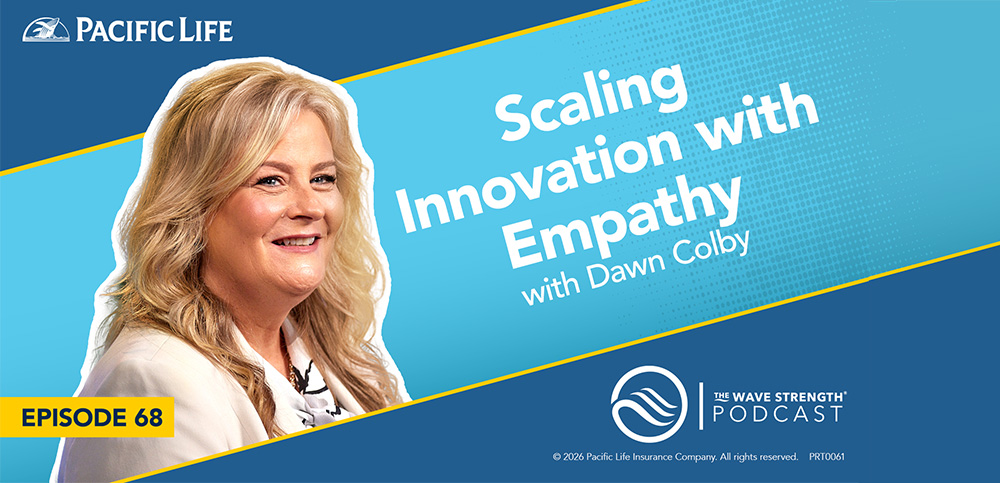
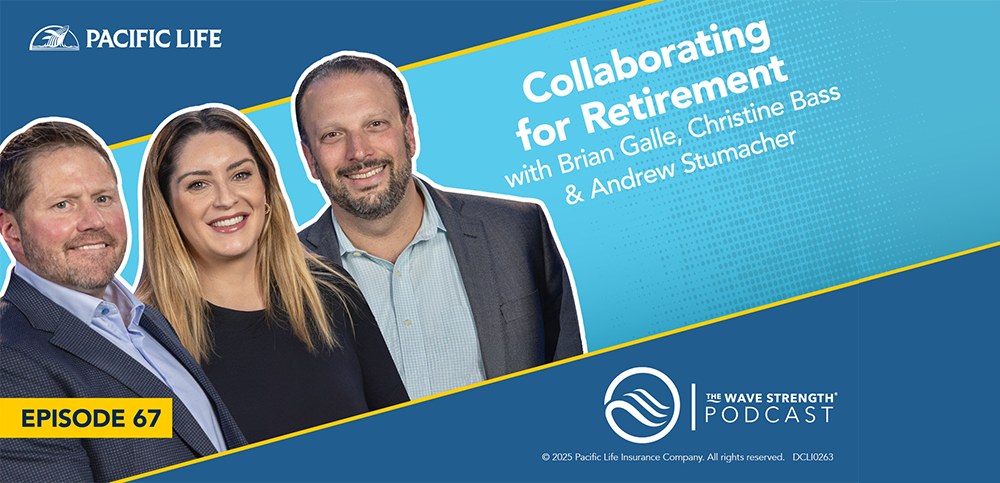
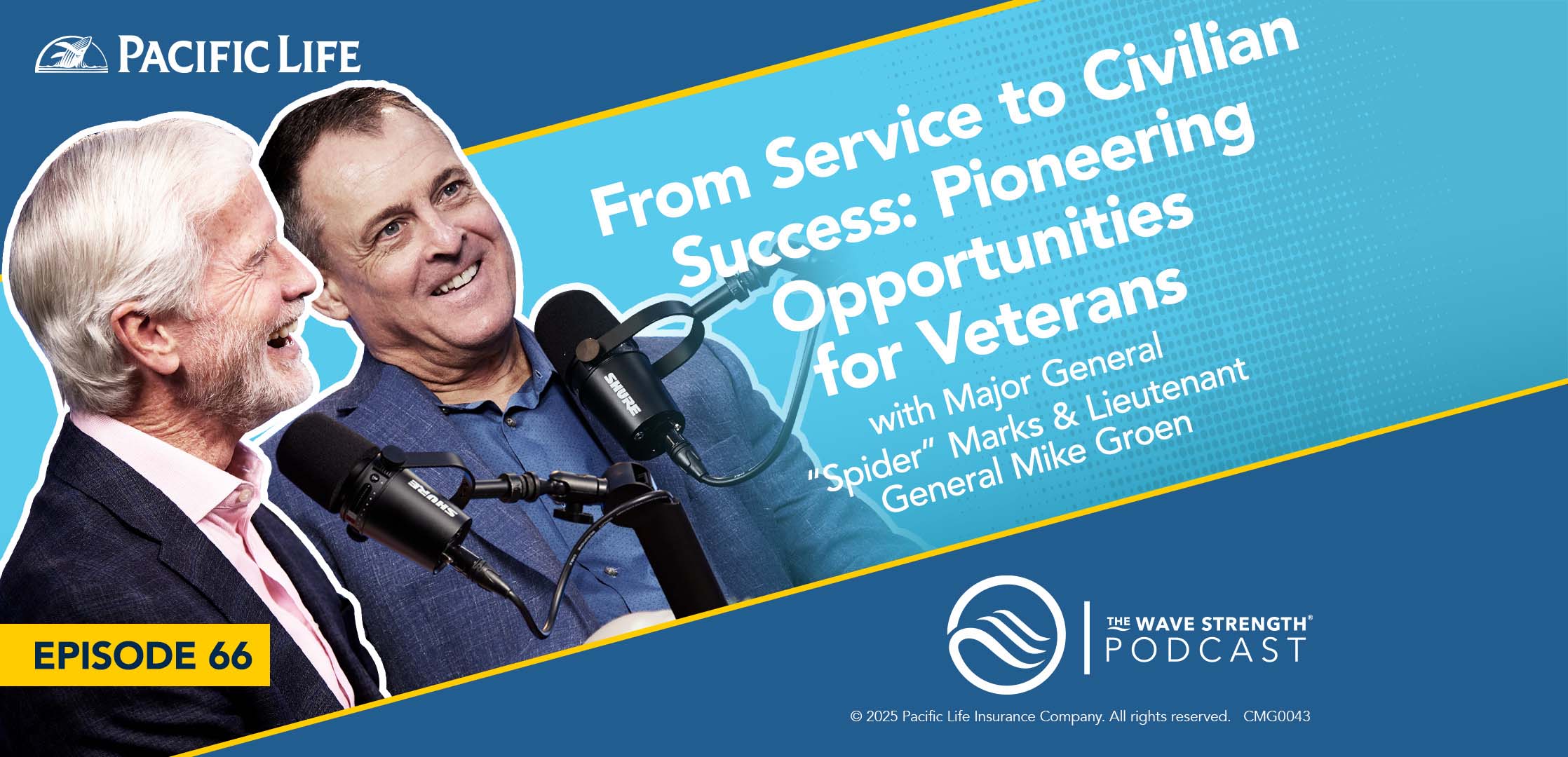
.jpg)

